#also i keep being like 'they adapted this so well in 1995'
Text
most books i wish i could experience for the first time again, but austen's novels really shine on a reread. going back through persuasion with fresh eyes, already knowing how everything ends, lets the reader really connect with and understand each character's motive, regardless of how shallow or petty.
i'm not typically an annotater but i bought a set of cheap paperbacks specifically to write on, and man. when i'm not writing essays at the end of chapters i'm doing this at every line that hits like a brick (which is most of them)

persuasion is so masterfully crafted and if you've read it before and liked it, i guarantee you'll love it even more a second time. damn. books good
#also i keep being like 'they adapted this so well in 1995'#or 'wow lady russell would love james norrington'#i am nothing if not a slave to my brand (loving persuasion 1995 and shoving norrington into every scenario possible)#bolt reads things#send help!
44 notes
·
View notes
Text
What the Ghosts have been watching on TV
Everyone
Channel 4 Home renovation shows: They're free with ads and there's an infinite amount of them so Alison puts them on for the whole gang when she and Mike have work to do in same way people put on YouTube videos for their dogs. This has backfired slightly as all the ghosts now have very strong and conflicting opinions on how Button House should be renovated.
The Great British Bake-off: A whole family event, they all get very invested. Kitty thinks Alison Hammond is the funniest person in the world. The Captain feels normal about Noel Fielding. As well as a watching it live, I'm sure they've also watched the whole back catalogue together.
Mama Mia: This where the Captain learnt his ABBA songs from. Pat and Julian enjoy the nostalgic music and I think the others are just bewitched by the story and music
Robin
Anything David Attenborough: For obvious reasons. I think he'd get a kick out of trying to do his voice. The others sometimes join in.
Cunk on Earth/ Britain: I think they've got a similar attitude towards history and I think he'd find serious historians trying to answer silly questions incredibly funny
Horrible Histories: He watches this with Kitty, they both find poop jokes funny.
Humphrey
Antiques Roadshow: I'm not sure why. I honestly think he's just glad to watch anything.
Mary
Gardener's World: I think she misses being able to look after plants and I think she'd be endlessly fascinated by how hosepipes work.
Mio Mao: She loves them fucking plasticine cats. She will not stop singing the theme song
Honestly think she'll watch anything with anyone and would get invested, she seems like the ideal person to watch telly with.
Kitty
Ru Paul's Drag Race: I think they all watch this every so often but Kitty is invested. There's bright colours, fun outfits and drama, it's definitely Alison's go to when she needs Kitty distracted.
90s and 2000s romcoms: I believe that every couple of weeks Alison and Kitty have a "girl's night" where they watch all the romcoms that Alison used to watch with her mum, mostly because I love watching romcoms with my mum and Kitty deserves that. Kitty is particularly fond of Twilight.
Thomas:
Any Jane Austen adaptations: He watches them with Fanny as they were both big fans when they were alive (its the only thing they agree on). Kitty also joins sometimes. His favourite is the 1995 Pride and Prejudice tv show.
Fanny:
Grey's Anatomy: I haven't seen it but my mum's a big fan and there's millions of seasons, I think she'd pretend she's not that into it but she definitely is.
Call the Midwife: Same as above.
The Captain:
M*A*S*H: I've seen about half an episode of this but it seems to be about fit young men in a war so it sounds like his thing. Probably Pat's recommendation.
Our Flag Means Death: I think Alison has been trying to sneakily show Cap gay media under the pretence of saying "it's just a fun show about pirates". I think the whole gang watched it together. The Captain definitely didn't cry at the end of season 1 why would think that?
Pat
Taskmaster: I think this is one they all watch together but it's definitely one of Pat's favourites. He probably attempted to set up his own version of the show with the ghost which ended horribly.
Doctor Who: I think he watched the original run when he was alive and was absolutely ecstatic to find out they made more. Julian makes fun of him for it.
Julian
Have I Got News For You: Has been airing since 1990 so he definitely watched it while he was alive. I think he likes to keep up with current politics but not in a very serious way so this is his middle ground.
Succession: I haven't seen this show but it seems to be about horrible men in suits being horrible to each other which seems right up his alley.
The Thick of It: Speaking of horrible men in suits being horrible. I think he watches this with Robin who has absolutely no idea what's going on but just laughs when Julian does and they have the best time. Julian is constantly pausing to add his own anecdotes
What We Do In The Shadows: Alison put this on as a 'let's show the Captain it's ok to be gay' show and the Captain was immediately horrified so Julian adopted it. He identifies with Lazlo.
#bbc ghosts#ghosts bbc#bbc ghosts headcanon#robin ghosts#robin bbc ghosts#humphrey ghosts#humphrey bone#mary bbc ghosts#mary ghosts#kitty bbc ghosts#kitty higham#thomas thorne#thomas bbc ghosts#fanny button#fanny bbc ghosts#the captain#the captain bbc ghosts#pat butcher#pat bbc ghosts#julian fawcett#julian bbc ghosts#mine
232 notes
·
View notes
Text
Colonel Fitzwilliam: Is it Canon?
Colonel Fitzwilliam’s name is Richard
Fanon (I’m using this term to cover adaptations and JAFF), not canon. His name is never given. I like to think it’s Darcy because that would be hilarious.
Colonel Fitzwilliam is physically attractive
Fanon not canon.
Colonel Fitzwilliam, who led the way, was about thirty, not handsome, but in person and address most truly the gentleman.
Apparently many people found the 1995 Col. F. handsome, leading to him being dubbed “Colonel HotPants” on Dwiggie, but 2005 shows a more realistic not hot:
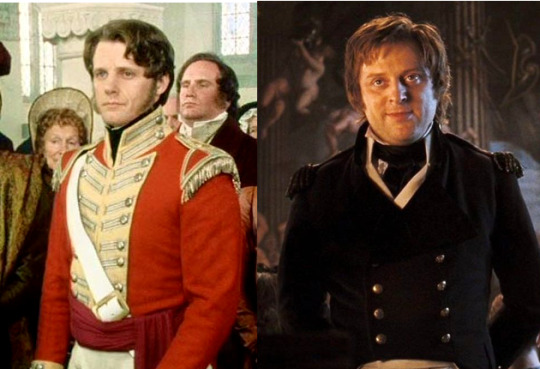
I also suppose that Colonel Fitzwilliam is often changed to hot because he’s the only single man left in Pride & Prejudice and people want to marry him off. Come on guys, the not handsome men deserve happiness too!
Colonel Fitzwilliam and Darcy are best buddies
Fanon, not canon. As much as Colonel Fitzwilliam is co-guardian with Darcy, he is not fully in his confidence. Col. F doesn't even know who Darcy saved from an imprudent marriage, he’s guessing:
I only suspected it to be Bingley from believing him the kind of young man to get into a scrape of that sort
Now if Darcy is just reserved or he knows Colonel F. is a gossip is unknown, but he would likely have told a true friend the name of his friend.
I suspect Darcy told Colonel Fitzwilliam something when he asked him to be a character reference about Wickham to Elizabeth, but it might have been as simple as, “Wickham is living in Miss Bennet’s neighbourhood, can you answer any questions she might have?”. I really doubt he confided the failed proposal.
Colonel Fitzwilliam swashes or buckles/is a military hero
Fanon, not canon. We know absolutely nothing about Colonel Fitzwilliam’s military career. Pride & Prejudice is set during the Napoleonic Wars and Colonel Fitzwilliam may have fought in France or in the colonies, but it’s just as likely he’s been stationed at home. Especially since he’s from the nobility!
Arthur Wellesley, who would become the Duke of Wellington, did not see active combat until he was one rank short of Colonel, and he went abroad on purpose because he was rejected by a woman he loved.
Colonel Fitzwilliam is a great guy
It’s hinted in Northanger Abbey that Captain Tilney is stationed in London and would be subduing riots. It makes sense not to have an eldest son in the actual line of fire. Similarly, we are told Col. F is “the younger son” of the Earl. If there is only an heir and a spare, they probably want to keep him alive.
Colonel Fitzwilliam wanted to duel Wickham
Fanon not canon.
We don't know what Colonel Fitzwilliam did when he learned about the Georgiana/Wickham affair other than keep it under wraps. It's clear Lady Catherine is unaware. But while dueling was common, we don't know if he's that sort of guy.
I was writing a JAFF once with an immoral Bingley and this idea is so strong in fanon that I was told Darcy was stupid not to "unleash" Colonel Fitzwilliam on Bingley. Unleash what??? We don't know what he can do!
Unknown.
Darcy Sr. did appoint Col. F as co-guardian to Georgiana, but we know how flawed his judgement is *cough Wickham cough* so that isn’t quite a recommendation of character. All we really know about Colonel Fitzwilliam is that Elizabeth likes him, and sorry Elizabeth, your judgement isn’t much of a recommendation either, especially since she compares him with Wickham!
It was plain to them all that Colonel Fitzwilliam came because he had pleasure in their society, a persuasion which of course recommended him still more; and Elizabeth was reminded by her own satisfaction in being with him, as well as by his evident admiration, of her former favourite, George Wickham; and though, in comparing them, she saw there was less captivating softness in Colonel Fitzwilliam’s manners, she believed he might have the best informed mind.
Colonel Fitzwilliam cannot afford to marry Elizabeth
Yeah, Elizabeth likes him because it’s clear he likes her. Another example of her being biased.
Colonel Fitzwilliam has a great relationship with Georgiana
Unknown.
The guardianship is probably more to protect Georgiana's fortune and make sure she marries well than to give her an extra parent. Col. F. doesn't say much about Georgiana and clearly hasn't been spending too much time with her since he hardly knows the Bingleys and they've been in company with the Darcys fairly frequently.
The fact is it just doesn't come up in the small section we have with him.
Unclear, but likely he can. Charlotte certainly thinks he can afford it:
In her kind schemes for Elizabeth, she sometimes planned her marrying Colonel Fitzwilliam. He was, beyond comparison, the pleasantest man: he certainly admired her, and his situation in life was most eligible
When Colonel Fitzwilliam calls himself poor, Elizabeth calls him out on it and he doesn’t refute her:
“He likes to have his own way very well,” replied Colonel Fitzwilliam. “But so we all do. It is only that he has better means of having it than many others, because he is rich, and many others are poor. I speak feelingly. A younger son, you know, must be inured to self-denial and dependence.”
“In my opinion, the younger son of an earl can know very little of either. Now, seriously, what have you ever known of self-denial and dependence? When have you been prevented by want of money from going wherever you chose or procuring anything you had a fancy for?”
“These are home questions—and perhaps I cannot say that I have experienced many hardships of that nature. But in matters of greater weight, I may suffer from the want of money. Younger sons cannot marry where they like.”
“Unless where they like women of fortune, which I think they very often do.”
“Our habits of expense make us too dependent, and there are not many in my rank of life who can afford to marry without some attention to money.”
All of these seems to suggest that Colonel F. could marry Elizabeth, but he wants to maintain his standard of life and that requires a larger fortune. Also, most military men received some sort of allowance from their parents/family and he might have that cut off if he married against his parent’s wishes. (The military didn’t actually pay very well.) All of this considered, he could marry but he doesn’t want to drop his expensive habits.
Now we do know he liked Elizabeth, “Colonel Fitzwilliam seemed really glad to see them: anything was a welcome relief to him at Rosings; and Mrs. Collins’s pretty friend had, moreover, caught his fancy very much.” and I do think he did the gentlemanly thing by letting her know that he didn’t want to marry her, but I still think Colonel Fitzwilliam is mercenary.
If his mercenary ambitions are justified or not is for you to decide as the reader. I think Colonel Fitzwilliam is part of the question of where we draw the line between avarice and prudence.
But really, the Colonel is a plot device to make Elizabeth aware that Darcy was the main player in seperating Jane and Bingley. He doesn't have a whole lot of depth and much of what people imagine about him is not supported by the actual book.
#colonel fitzwilliam#fanon or canon#pride and prejudice#swashbuckler#elizabeth bennet#it all works into the main idea of the story which is how to choose where is prudent or greedy to marry#I need to do one of these for Caroline Bingley#but they are taking a lot of time!#colonel hotpants#colonel plot device
111 notes
·
View notes
Note
Hello! I just wanted to say that I really love In the Black and Black Mask! I adore your take on the Black family because to me it makes so much more sense than the usual Walburga and Orion casually Crucio-ing Sirius at every mistake take. I really enjoy seeing how history tends to repeat itself in terms of familial relationships, because it's something I see often on families. Also most of their relationships with one another are complicated, and never clear cut.
I loved the most recent chapter, it was honestly hilarious. Ted is absolutely the hero of this chapter, he's the only sane man there and I love how he takes the Blacks being well... The Blacks, in stride. Also Dora just latching onto Cygnus was wonderful and him getting offended when Dora said "but I thought you didn't like us?" was so funny. Seeing Walburga break down was so painful, I think in part because she always appears as strong. Sirius calling her Mama and then hugging her was so wholesome. Also, his 'Reason You Suck' speech to Arcturus had me gasping with both awe and horror in real life because all of these characters are so alive they feel like actual people. Your dialogues are absolutely brilliant, and so much of their personalities shine through from how they speak and react to things.
Also I absolutely love Colette, she's definitely someone who keeps Sirius grounded. Her touching his wrist and telling him to speak to James was so intimate, it felt much more intimate than a spicy smut things or things like that. It reminds me of Pride and Prejudice where there's not actually much PDA going on, but it's infinitely more romantic to me because you can feel the affection between these two people. Also, Colette just shamelessly kissing Sirius in front of everyone (including her own parents!) and calling him darling got me grinning.
I'm excited to see how her parents will react (her mother in particular), because Fabienne (I'm sorry I can't remember her mother's name) strikes me as not having much hope for Colette as long as she marries a respectable pure-blood wizard because she set her sights on Rabastan who is a second son, thus unlikely to inherit, instead of someone like Evan Rosier who is already the head of the family. But then Colette went and snagged the heir to one of the most powerful families in Britain.
I'm sorry for the long comments. Kudos <3
This is a very sweet comment! Thank you!
To be compared with Austen is so flattering, because tbh she is a major inspiration to me in general as a writer and storyteller and in particular for this story. I was re-reading a section of the story and realized that I had flat out stolen phrases from Austen/Austen adaptations (1995 P&P in particular.) Sorry, Jane!
Sirius's rant to Arcturus was peak Reasons You Suck speech, good use of the trope.
I'm glad you enjoy my interpretation, I find it far more interesting (and frankly, fun) than the popular fanon portrayals of over the top abuse and crucio-ing etc.
It's become a bit of a sticking point for me, because I've been accused directly/publicly of putting the blame for the dysfunctional family relationships on Sirius/white-washing abuse more than once. Which I resent, a bit—I don't think I've ever presented the Black parents as healthy or good (though they are entertaining in their problematic manipulativeness at times and I can't deny that I do occasionally play that for laughs.) What I've tried to show (with mixed success, clearly) is that Sirius's coping mechanisms are the product of their bad parenting and don't actually make him a happy/healthy person because he still loves his family, in spite of them being objectively awful. Which I think is probably relatable to many humans on the planet? There's a desire for a relationship with our parents.
As it's a version of characters who never appeared in canon, I would call my softening of them "alternative character interpretation", though I will maintain until the end of time that there's nothing in BSDU characterization directly contradicted by canon.
26 notes
·
View notes
Text
WHAT IF: 60th Anniversary Collection of novel reprints
I love collecting Doctor Who books. I have slightly over 40 of them now, including novelisations, anthologies, script books, and stuff about the making of the TV show. But majority of my collection consists of original novels.
The 50th Anniversary Collection! Back in 2013, BBC Books released a collection of 11 reprints for the 50th anniversary, one book for each Doctor at the time. What a great idea! And they had cool matching covers!
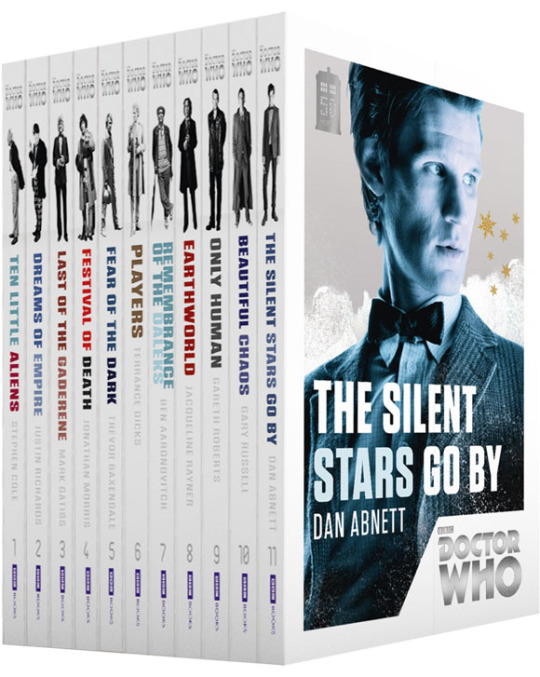
Now, for the record, I have to admit - I only have one of these reprints: Festival of Death by Jonathan Morris. I would buy more of them, but I'm not interested in every single book in the collection. And I already own the previous printings of Dreams of Empire and The Silent Stars Go By, so there's that.
But these reprints seemed like a wonderful idea, so BBC Books did it again. In 2014, they released The Monster Collection - 8 books featuring 8 iconic monsters. In 2015, they published The History Collection - 8 books, all set in various periods in the past.

And in 2016... they just stopped. Because of course they did.
With the upcoming anniversary, I've been hoping for a revival of this inniciative. But as far as I know, no new reprint collection is coming... So listen up, BBC Books! Here's a list of DW novels you should reprint!
Okay, since this is my version of the list, I've only included stuff that I don't already own. There might be more suitable candidates, but I already own The Stealers of Dreams, The Tomb of Valdemar, The Good Doctor, and Alien Bodies. So, you know.
Rule no. 2: No reprints from the previous three collections.
And also - this list includes some novels originally published by Virgin. Now, this probably shouldn't be a problem? While no VNAs or VMAs were included for the 50th collection, they did reprint some for the subsequent two collections. Big Finish have also managed to get the rights to adapt them. Therefore I think this probably wouldn't be a huge problem for BBC Books. Still, I decided to include an alternative for every Virgin novel on the list.
So, here it is!
First Doctor: The Time Travellers by Simon Guerrier
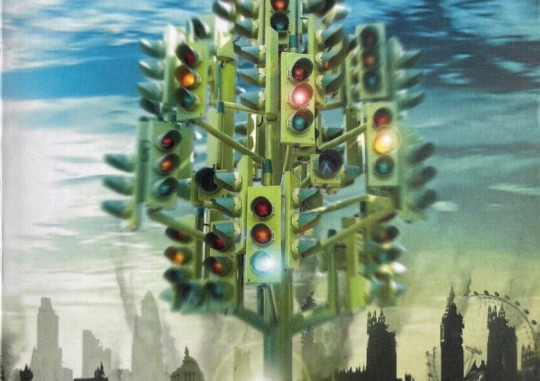
Susan, Ian, Barbara
2005
After reading "Journey Out of Terror" in The Target Storybook, I desperately want more of Simon Guerrier writing for the 1st Doctor, Ian, and Barbara. He just gets their voices so well!
Second Doctor: The Dark Path by David A. McIntee

Jamie, Victoria
1997
The Master has probably almost as many origin stories as the Doctor. This is one of them. As a consequence of that, this book is quite expensive on ebay.
The second Doctor vs Delgado's Master. My fan brain just can't resist this one.
(Alternatively: The Indestructible Man - Simon Messingham)
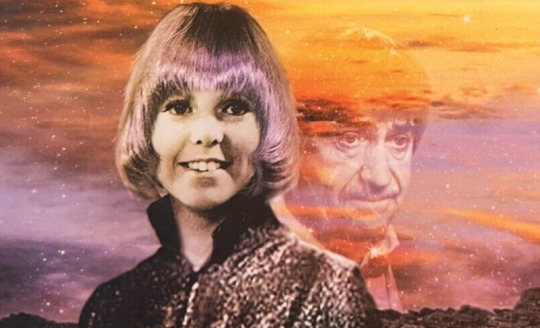
I love Messingham's Tomb of Valdemar, so I'd like to read more DW stuff written by him.
Third Doctor: Verdigris by Paul Magrs
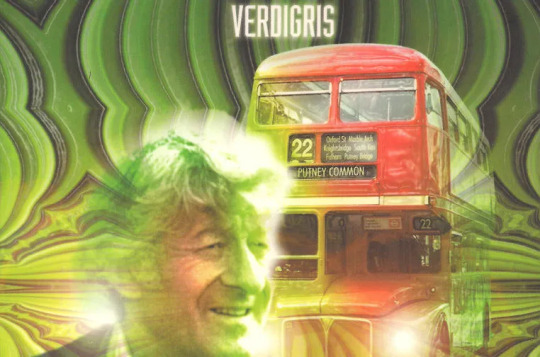
Jo, Brigadier, Yates, Benton
2000
Featuring Iris Wildthyme. Yeah. Reprint this one.
Fourth Doctor: Scratchman by Tom Baker and James Goss

Sarah Jane, Harry
2019
A new-ish book for the fourth Doctor, largely here because it's such a legendary bit of trivia - Tom Baker and Ian Marter plotted an Doctor Who movie together in the 1970s. This is the novelisation of that movie that never was.
Fifth Doctor: Goth Opera by Paul Cornell
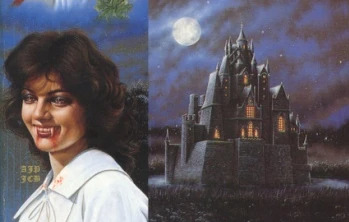
Nyssa, Tegan
1994
Paul Cornell writing for the fifth Doctor? Vampires? I want to read this.
(Alternatively: Divided Loyalties - Garry Russell)

While not known for being particularly good, it features the Toymaker. And somehow had a huge influence on this website. It deserves a reprint.
Sixth Doctor: Millennial Rites by Craig Hinton

Mel
1995
This just seems like the most interesting thing that anyone has ever done with Valeyard, as well as having a really fun premise. Again, I really want to read this.
(Alternatively: Mission: Impractical - David A. McIntee)

Frobisher's in it.
Seventh Doctor: Lungbarrow by Marc Platt
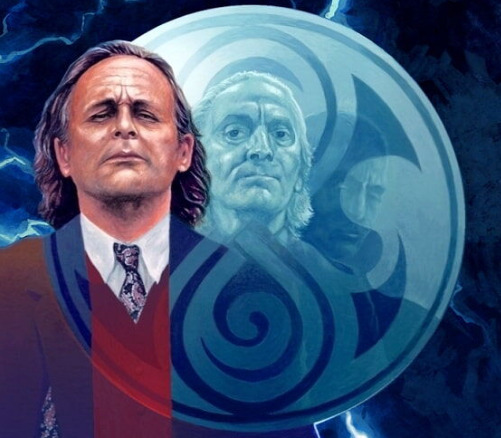
Chris Cwej
1997
They can't keep getting away with not reprinting Lungbarrow. It's the big one. Also, it's one of the most expensive DW books on ebay, so there's that.
Unfortunately, the Doctor Who office seemingly perceives it as a "can of worms", so I'm not holding my breath. Still, they really should reprint it. I feel like it's a key text in the history of Doctor Who and I want to get my hands on it.
(Alternatively: Atom Bomb Blues - Andrew Cartmel)
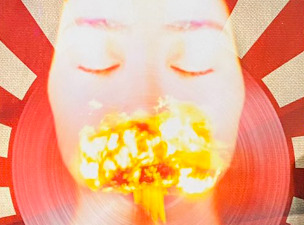
It's Andrew Cartmel, seemingly getting heavy and political.
Eighth Doctor: Vampire Science by Kate Orman, Jonathan Blum

Sam
1997
There are so many worthy candidates for reprints from EDAs, but I've decide to go back to the beginning... Not the very beginning. I've read The Eight Doctors it's not worth it. But from what I've heard, Vampire Science definitely is.
Ninth Doctor: The Deviant Strain by Justin Richards
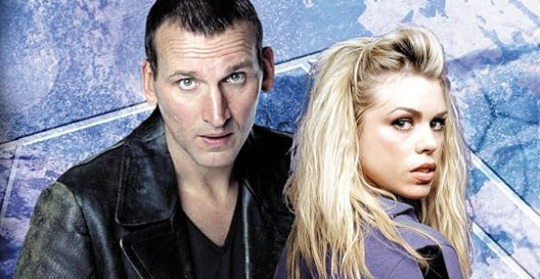
Rose, Jack
2005
Gotta admit, this one was something of a random pick? The ninth Doctor doesn't have a lot of books, so might as well go for this one.
Tenth Doctor: The Story of Martha - Dan Abnett

Martha (obviously)
2008
Not only is this a story centered on the best companion of the RTD era, but it also features short stories that Martha tells people? Including one written by ROB SHEARMAN??? This is an auto-include for the tenth Doctor book.
Eleventh Doctor: The Coming of the Terraphiles - Michael Moorcock

Amy
2010
Around the time when DW books weren't really an important part of the series, something wild happened - a hugely important and influential fantasy and sci-fi author wrote a book featuring the eleventh Doctor. No idea why. I'd love to read it, tho.
Twelfth Doctor: Blood Cell - James Goss
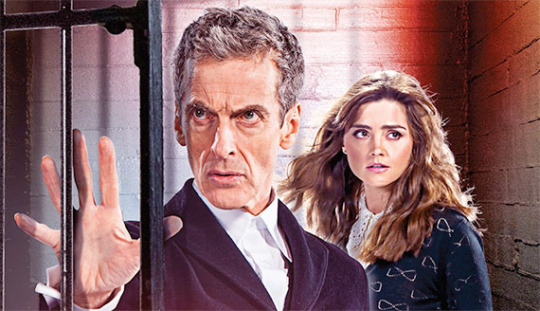
Clara
2014
It's the only book from the first batch of 12th Doctor books I don't have. From what I've heard, it's also the best one. I love some of James Goss' other work, so I'm inclined to believe that.
Thirteenth Doctor: At Childhood's End - Sophie Aldred

Ace, Graham, Yaz, Ryan
2020
I love Ace. A friend of mine once told me that this book is amazing, so I'm gonna believe him. It's going on the list.
And there you have it! A list of Doctor Who novels I'd reprint for the 60th Anniversary, if I could. Give them beautiful new covers (matching, obviously) and it's the 60th Anniversary Collection.
On the upside, BBC Books gave us a sextet of new books for the anniversary, which is really cool. And one of them is an epic poem! And one of them is written by Dave Rudden! So there are Doctor Who books to buy this year.
But I really hope they are gonna start doing some reprints again. I think these books deserve it.
#doctor who 60th anniversary#book collecting#doctor who books#edas#dweu#reprint more doctor who books#bbc books#penguin books
2 notes
·
View notes
Note
I read your tags about Emma 2020 and I’m dying to know… what things did you wish to change? (But also, I don’t want to be a Negative Nelly, so by all means please tell me what you loved instead or as well!)
Just a couple of things about how Harriet's storyline was wrapped up. Firstly, when Harriet and Emma are talking about Mr Knightley towards the end, Harriet says "you think of Mr Knightley for yourself!" I don't like this change. I don't think it's necessary for Harriet's arc, and I actually think it's important for Emma's arc that she come to that realisation under her own steam. I have to assume that's there for the viewer, in case we haven't realised what's going on with Emma - but Anya Taylor-Joy's acting is more than good enough on its own. I think it's believable for this version of Harriet to assume that Emma doesn't think she's good enough for Mr Knightley, and to get annoyed with her accordingly, but I think the way it plays out is a step too far.
The other thing I didn't like is the way the mystery about Harriet's parentage is cleared up. In the novel (and I have just skimmed the last few chapters online as a refresher so I might have missed something), Harriet's engagement to Robert Martin is celebrated as a good thing at least a chapter before she finds out her father is a tradesman. By linking the two, I think the film actually ends up being a less effective critique of the class system than Austen's novel. She does end up mostly pairing people with others of roughly the same class background (in Emma and in general), but I actually think this is where she comes closest to undermining that, as permitted by Harriet's unknown parentage. In the novel, it's Robert Martin's good qualities as a man that make it good news that Harriet is engaged to him - not either his circumstance or his lack of it - and I don't like the way Harriet links the two pieces of information together in the film, as if it would have been reasonable for her to keep thinking of Mr Knightley as long as her background was unknown but now that she knows she's the daughter of a tradesman Robert Martin is fine. It feels like that's sort of the subtext of that conversation, which strikes me as a less egalitarian conclusion than the one Austen wrote two hundred years ago!
I had a couple of other bugbears (John and Isabella Knightley are meant to be a happy couple, for instance, even though Isabella is so fretful), but those are all things I am willing to concede make sense as changes - the bits with Harriet are the only bits that actually annoyed me.
That said, I loved basically everything else. I thought it was very well-cast, I really loved the use of humour, and I loved the whole aesthetic. I think it takes Emma's apologies really seriously, and I like that it has Emma apologising to Robert Martin as well, and being the catalyst for him to propose to Harriet. Miranda Hart was a particularly good Miss Bates and made her simultaneously very sympathetic and very irritating, just as she is meant to be. I also loved Bill Nighy as Mr Woodhouse, and I don't think I'll ever read the book again without hearing his voice, just as I can't read Pride and Prejudice without hearing Alison Steadman as Mrs Bennet. And more than anything else, I really loved the relationship between Emma and Mr Knightley. They have such brilliant "best friends who are in love but haven't realised yet" energy, and that is just always my favourite thing to see. I think this is probably going to go on the list of my favourite Austen adaptation along with the 1995 P&P and the Emma Thompson S&S, so take my criticism with a whole handful of salt! I'm so glad I finally watched it. It took two days to download on my hotel's rubbish wifi, which isn't good enough to stream anything, and it was totally worth the wait.
3 notes
·
View notes
Text
alright it’s time for Switch’s List of October/Halloween Games: Updated Edition
any game listed here either is a horror game, or has suitable aesthetics/theming, and on the older or niche side. naturally, disclaimer to check content warnings on any game you may be interested in.
bolded games: full recommendation to check out
italic games: mostly here for the sake of being thorough, they’re not well-liked and i wouldn’t personally recommend them, but they may be a curiosity or you may find something you like
bolded italic games: picture i’m making the so-so hand gesture. there may be technical hurdles to running it, or it’s just a game i have more mixed feelings on.
if you want the best Myst-like game, which makes well-balanced QoL improvements to the genre that allows it to appeal to both myst-like enthusiasts and people who might not normally like them, with fantastic audio/visual design: play Shivers
if you want one of the best adventure games and one of the best story adaptations ever made: play I Have No Mouth and I Must Scream
if you want a uniquely free-form dark humor adventure game that still has a plot, different endings, different playable characters, optional objectives, and the 2nd most unpleasant visuals i’ve ever seen (and i mean this as a compliment): play Bad Day on the Midway
if you want the most unpleasant visuals i’ve ever seen (this is a compliment), a highly unique adventure game with multiple endings, and you also want to support a creator-revived game that was inaccessible for years and isn’t talked about enough: play Garage Bad Dream Adventure
if you want an adventure game with frequently obtuse mechanics but fantastic stop-motion visuals and a more subdued (but still dark) tone than some of the cheesier games here: play The Dark Eye (1995)
if you want another one of the best entries in the adventure game genre, featuring highly creative levels and a narrative that’s a lot more genuine and cohesive than the premise might make you think: play Sanitarium
if you want a unique shock-horror comedy adventure game with a highly engaging first half if it falls apart during the last third: play Harvester
if you want an action adventure game that had a lot of interesting ambition put into it, but ended up a technical mess and overshadowed by resident evil 1: play Zombieville (1997, EU) (game can be finished but is unstable and can failstate, its TCRF page discusses these issues)
if you want a cornerstone early point and click horror game with fun music, fun visuals, and cheesy FMV: play The 7th Guest
if you want the worst aspects of The 7th Guest but dialed up to 11: play The 11th Hour
if you want a Shivers game that is pretty much Shivers in name only, but does keep the improvements 1 made to the Myst-like genre: play Shivers 2 (please play 1 as well)
if you want another landmark entry in point and click horror with a lot of gratuitous shock horror/gore and cheesy FMV acting, but with a higher degree of intensity and taking itself seriously than Harvester: play Phantasmagoria
if you want a Phantasmagoria game that even Phantasmagoria fans are mixed-to-negative on: play Phantasmagoria 2, i guess
if you want a CD-ROM horror-themed boardgame with sick bongo music and a disembodied voice frequently heckling you: play Atmosfear: The Third Dimension…?
if you want an action-adventure game with deliberate platforming, punishing combat, weapon unlocks that are so busted it’s fun, fantastic level design+music, and one of the only works to successfully pull off “what if alice was dark”: play American McGee’s Alice (try to get the original release if you can, not the post-madness returns 2011 version, but it’s not a dealbreaker)
if you want american mcgee’s alice with overall worse combat and more filler, but with highly improved, responsive platforming and the addition of a rewarding collectible system, with a cathartic narrative: play Alice Madness Returns
if you want one of the best survival games i’ve ever played with one of the best narratives in a VN-influenced format i’ve ever read: play Pathologic Classic HD (it’s fine to use a walkthrough)
if you want more pathologic and you’re fine with playing a game that’s probably never going to be finished: play Pathologic 2
if you want a short, honest-to-goodness 2009 art game/walking simulator with minor collectible elements, multiple endings, and beautiful music and visuals: play The Path
if you want a good h.r. giger horror adventure game: play Dark Seed
if you want (this will explain everything) a Dark Seed game that even Dark Seed fans are mixed-negative on: play Dark Seed 2
if you want a cornerstone graphic adventure game that is a functional evolution of Mystery House, with a murder mystery and a shocking amount of detail and different things that can happen and good replay value: play The Colonel’s Bequest
5 notes
·
View notes
Text
My Review of Princess Sara

And now I return for more World Masterpiece Theater.
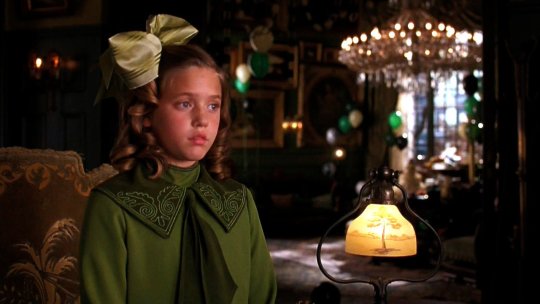
Today’s classic is something I’m somewhat familiar with. The series is loosely based on the novel titled, “A Little Princess” by Frances Hodgson Burnett. There were several adaptations for film and television throughout the past several decades including a Shirley Temple film in the late 1930’s, an Americanized version in the 90s, and about a bajillion Filipino adaptations. The one I’m most familiar with was the one that came out in 1995. I remember this film very well as it was played a lot in my youth and as an adult, I would come across it from time to time on HBO or some other station playing it. It was fine and all, but I knew that this film took artistic liberties and changed around a lot from the novel.
After watching several of these World Masterpiece Theater animes, I’ve come to realize that these series are pretty damn accurate when it comes to capturing the original source material. I mean yes, Les Mis took a lot of liberties to remove several characters from being killed off, but it was still top tier best version. All of these animes have to take a few liberties as they are all G-Rated. But they’re still very good nevertheless. I was curious about this particular story for the longest time and thought it was high-time I sit down and watch the anime version.
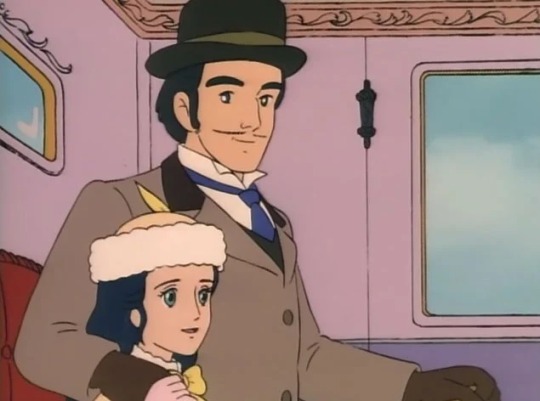
Sara Crewe and her father arrive in London from India. Back home, Sara was treated a lot like a princess and she acted like one. Not the bad kind, the Princess Diana kind, she’s a sweetheart. Sara is about to be admitted to a boarding school, Miss Minchin’s all-girl’s boarding school that is! Once at school, Sara was beloved by most of the students and praised by teachers due to her academic skills. On top of which, her father is loaded! Yeah, her father is in the diamond business back in India and so he has enough money to keep her daughter happy.

Unfortunately, when Sara’s father dies news also comes that the family is bankrupt leaving Sara without a penny to her name. Surely Miss Minchin will care for the poor orphan girl, right? Ha, I already know this story. Miss Minchin strips Sara of her education, clothes, and housing. Even though she tossed around the idea of casting the orphaned girl to the streets, Miss Minchin takes pity on the girl. Sara will live in a cold attic and work as a scullery maid. Sara is to do as she’s told by her higher-ups, never talk with the other students, and must work until she pays off her debts to Miss Minchin.
BETWEEN THE SUB AND THE DUB: As I’ve mentioned in the past, only a few of the World Masterpiece Theater animes were dubbed into English. And this was one of them…sorta! Our good friends at Animax did one. And if you’re unfamiliar, this is the company from Southeast Asia that dubs anime into English. And if that still doesn’t ring a bell, look up the Cardcaptor Sakura dub and you’ve got your answer. As usual, this anime has made its way across the globe to many different countries and territories. Apparently, it was a big hit in the Philippines. So much so that there’s a plethora of memes surrounding this one series! As for the cast, it’s a mixture of veteran voice actors that are still voicing today, lesser-known voices, and one-timers. And as this is a part of the World Masterpiece Theater collection, some voice actors here were heard in other works throughout the years like Naoko Watanabe and Eiko Yamada. Here’s what you might recognize these folks from.
*Sara is played by Sumi Shimamoto (known for Okita’s sister on Gintama, Kanata on Lucky Star, Ishizu on YGO, and Flora on Berserk 2016)
*Becky is played by Teiyuu Ichiryuusai (known for Masao on Crayon Shin-chan)
*Miss Minchin is played by Taeko Nakanishi
DISLIKED CHARACTERS: Oh-ho-ho, I knew going in that I was going to hate two specific characters! Those two are Lavinia and Miss Minchin. Though when I watched the movie, it was more of a hatred for Miss Minchin overall and Lavinia was a passing thought. Has this anime changed my thoughts on these two?
Right from the starting gate, they are both detestable and will continue to be that.
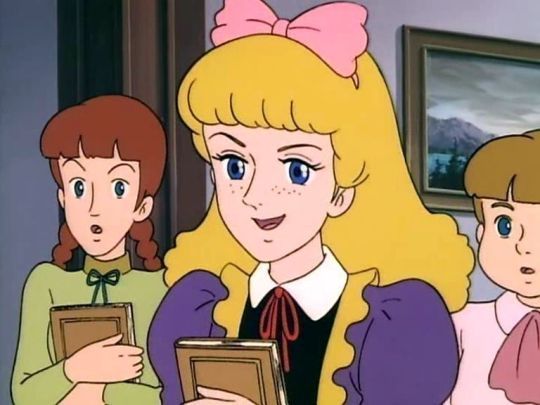
Lavinia is a snot-nosed brat who gets jealous every time Sara gets attention from the teachers. But the greatest injustice done to Lavinia was that Miss Minchin took Lavinia’s role of class rep and gave it to Sara. So the bitch was butt-hurt. But when Sara’s father died and she loses her wealth, Lavinia showed absolutely no sadness. In fact, she was the only person in the room smiling. What a bitch! And when Sara became a scullery maid for the seminary, Lavinia made sure to screw around with Sara by any means necessary. She gets a kick from making the poor girl suffer or get yelled at. Seriously, every time you see this snot-nosed brat glare at Sara I’m screaming, “JUST LEAVE THE POOR GIRL ALONE!”
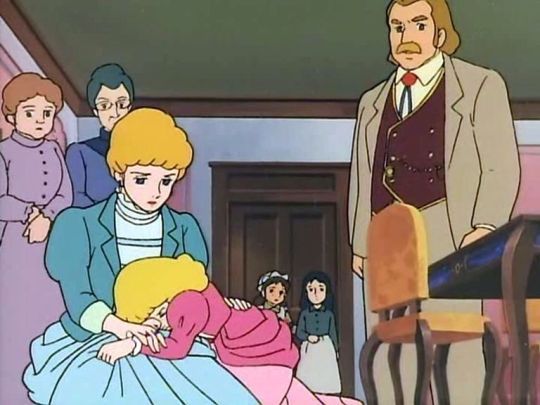
Thank God there was a second of peace. Lavinia’s father learned that Sara was once a student but is now a scullery maid and Lavinia being so insistent that Sara become her personal maid. He slapped the freckles off that bitch’s face. Give that father a cash prize and a trophy! Mind you I said one second of peace. The next episode she was right back giving Sara (and Becky) a hard time. Lavinia does so much to Sara that I can’t believe Sara managed to remain civil throughout the entire ordeal.

And as for Miss Minchin, she’s had it out for Sara from minute one. But because her father was wealthy, she decided to use Sara to show off to high society people. And the brewing point for Miss Minchin to vow vengeance against Sara was because Sara hid the fact that she was fluent in French. The audacity of this bitch! But again, because of Sara’s father, she sucked up. Miss Minchin’s true colors came out in front of Sara when it’s learned of her father’s death and failed diamond business. No pity on the girl who just lost everything. She was ready to throw her out on the street, but was begged by others to keep her as a maid.
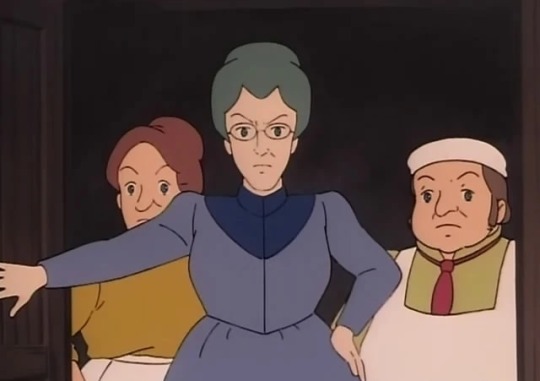
Miss Minchin would be terrible to Sara. She physically abused her, starved her, forced her to live in unlivable conditions, and had the other workers (Molly and James) work her like a slave. One of the worst moments was when Sara got severely ill. Never mind pushing Sara to the point of illness, this woman had to think for a moment to get a credible doctor to look at her. She got the cheapest, drunkest doctor they could find who misdiagnosed her. Miss Minchin even thought about sending Sara to a sanitorium if this persists. Bitch, I can’t even with you! At least in this version, Miss Minchin never sent the police on Sara. Of the three versions to this story I’ve watched, I think this Miss Minchin was the cruelest. Only because we do witness her slapping Sara several times!
SHIPPING: I know I shouldn’t be shipping anyone with anybody. Most of the people in this story are young. VERY YOUNG! As for the adults, there were no romantic interests for anyone here. It’s plainly clear that Miss Minchin is going to die a spinster. None of the teachers had secret relationships with some guy like in the Shirley Temple version. And Miss Amelia didn’t run off with the milk man like in the 1995 version! None of that went down in this adaptation.
With that said…
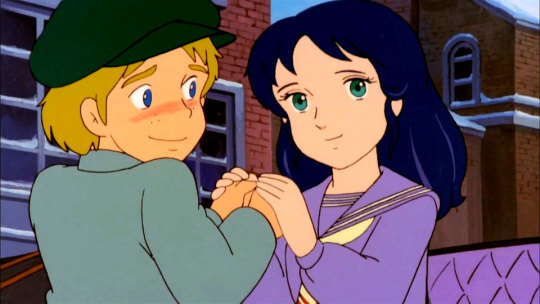
Peter x Sara is cute! I would support the hell out of this even though it probably isn’t canon.
ACCURATE OR NOT: So let’s see if Princess Sara really stacks up to the novel “A Little Princess”.
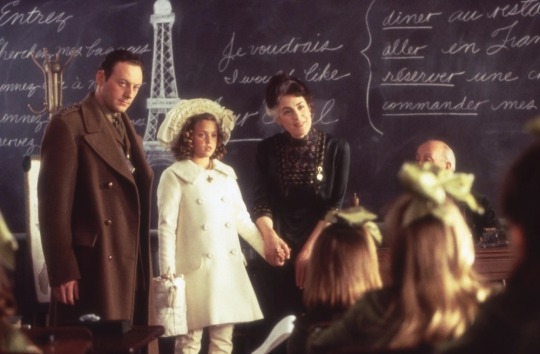
*Oh-ho-ho, time to nail my childhood to a wall. As you know, I’m well familiar with the 1995 rendition of A Little Princess. If you’re like me and know this film from start to finish, get ready to have the balloon pop. Becky’s not black. The story takes place in London, not New York City. The story really takes place in the late 1800s, not World War I times. Ralph Crewe didn’t leave his daughter to fight in a war. And finally the most important fact, Ralph Crewe remains dead. Most of the things I mentioned here were used correctly in this adaptation.

*There are some new characters added to the series. And quite frankly, I’m not entirely sure who these people are. Except for the animals! With the exception of Ram Dass’s monkey, I don’t think Miss Minchin’s cat Cesar nor the family of rats exist.
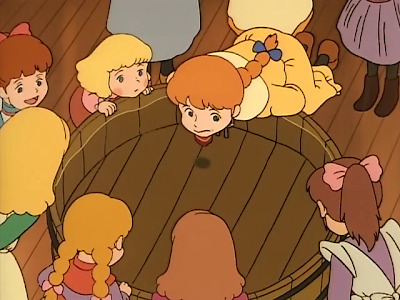
*Most things in this anime are pretty accurate to the original source. But there’s a good chance that most of the episodes were either fabricated or stretched out to fit the running time. You know, fillers! Call me crazy, but I don’t think the book had chapters involving a Halloween party. Same goes for that episode where Amelia opens up to Sara about her past with her sister.
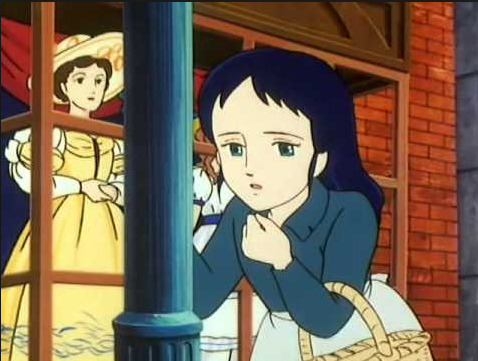
*It is unknown how long this experience for Sara lasts anime-wise. In the book, Sara’s time at Miss Minchin’s seminary was approximately 2 years. The way I see it, I don’t think Sara was a scullery maid for more than a year in the anime. If she were, we would have probably gotten an episode of Sara celebrating her first birthday without her father.

ENDING: Around episode 30, the home next to Miss Minchin’s seminary was sold to a gentleman from India named Mr. Carrisford. He was able to survive a gnarly bout with Jungle Fever, although now he’s confined to a wheel chair. But Mr. Carrisford has an overwhelming sense of guilt due to how things went down in India. See, he convinced his long-time friend to go into business with him involving a diamond mine. But the friend died from his Jungle Fever, leaving behind a daughter and a whole legal battle involving bankruptcy.
In case you’re not keeping up, Mr. Carrisford’s friend is Ralph Crewe, Sara’s father. Sara is just several feet from the gentleman who can save her from the living hell of Miss Minchin’s seminary.
But Medea, we’ve got over 15 episodes left!
Correct, dipshit! Mr. Carrisford doesn’t remember a lot, probably due to the Jungle Fever. He doesn’t remember Ralph’s daughter’s name. And he forgot where Sara was sent for her education. In fact, he was way off. Mr. Carrisford had his friend travel by boat to France in search for this girl. So I’m sitting here episode-after-episode screaming at the screen, “SHE’S RIGHT THERE, YOU IDIOT”. But because of Sara’s friendship with Ram Dass (Carrisford’s caretaker), he saw to it to repay Sara for her kindness. Ram Dass would spend days and nights going to the attic to give Sara warm blankets, clothes, and food. Sara thought it was a magic spell or a guardian angel looking out for her. It wasn’t long before Miss Minchin saw these special items in the attic and threw Sara out to sleep in a horse stable.
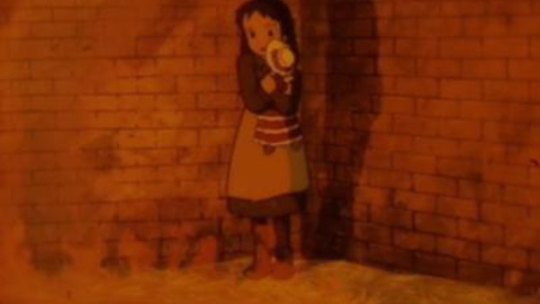
Things only get worse from here when one night the stable catches on fire and Sara almost burned to death. And then she gets blamed by Miss Minchin for starting the fire! This is the one and only time I’ve ever seen Sara stand up to Miss Minchin as she was not at fault. I know it’d be asking too much to have Sara tell Miss Minchin to fuck off, but this was big for Sara to stand up for herself. In actuality, Lottie accidentally dropped a candle when she was scared by (you guessed it) Lavinia and her friends. But no, Miss Minchin jumped to every wrong conclusion and threw Sara out of the seminary. Fortunately, Sara was taken in by Peter and his family and she was even able to get a job like many of the other children in the area.
Sara’s going to be a little match girl!
This anime hurts to watch. This anime hurts a lot.
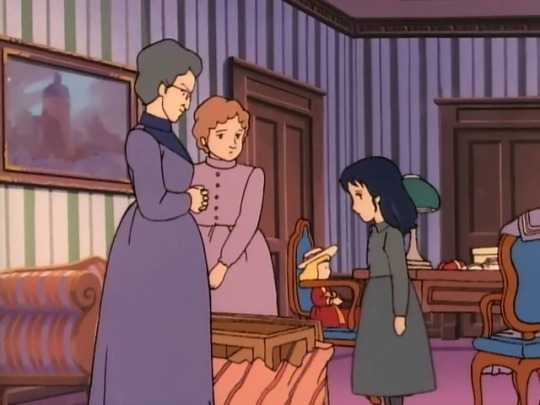
Thankfully Sara’s stint as a little match girl was short-lived as Miss Amelia came looking for her and brought her back to the seminary. The only reason behind that is because there was a big care package addressed to Sara. Miss Minchin made it very clear that she still despises Sara. But Minchin flips her light-switch when she sees the care package contained beautiful clothing and such. Because she thought Sara was being watched by a wealthy and anonymous family member, she allows Sara to live in the attic and attend classes instead of doing chores with Becky. She goes back to kissing her ass. Again, the audacity of this bitch!
Moving back to Mr. Carrisford’s dilemma! He sent his solicitor to France in search of Ralph Crewe’s daughter. He returned with no such luck of a daughter. Then, they decide to hone their search to right here in England because this is where Ralph was from. Thankfully, fate intervened before they start another grand search as Sara came by the home to return Ram Dass’s monkey. Here it is, the moment we’ve all been waiting for. Sara meeting Mr. Carrisford! He learns Sara knows some Hindu and grew up in India. He put 2+2 together and realized the girl from next door he’s been secretly helping was really Ralph Crewe’s daughter all along!
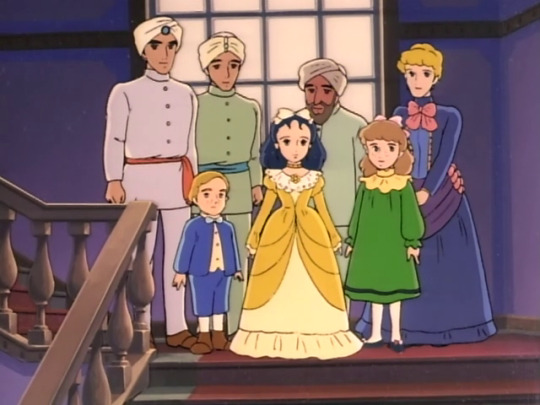
When Miss Minchin went next door to retrieve Sara, she was in for the shock of her life. Carrisford is going to adopt Sara. The diamond mine that was rumored to be a bust, was really fortuitous. Sara’s debts are wiped away. Not only is she inheritor to her father’s share, but she will also obtain Carrisford’s share when he passes (he has no heir of his own). And to top it off, he knows about the abuse of Sara so Sara is going to live next door instead of a creaky attic. You know, it’s not nice to kick people while their down. But fuck that, this bitch has needed a royal-ass beat down since episode one. Time for Miss Minchin’s sister to have her say!
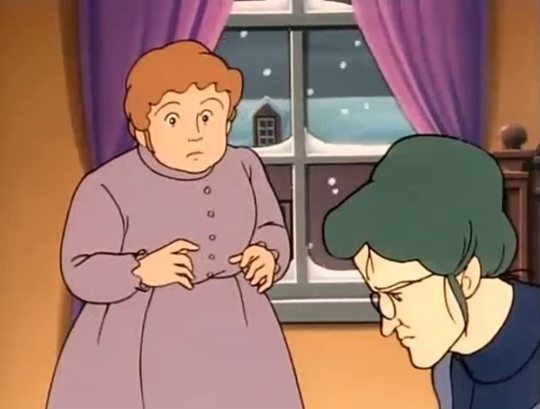
MISS AMELIA: Throughout these 40-odd episodes, she is seen as the submissive sister, doing whatever Miss Minchin says. Amelia just stands there looking concerned every, single, fucking episode and does fucking nothing! She sees Sara suffering in silence with a smile on her face and says nothing to her sister. She even goes a step beyond that by begging Sara to forgive her sister several episodes prior to this very moment. We do get some light shed on Miss Minchin and Amelia’s past about how Miss Minchin worked odd jobs to take care of Amelia due to lack of parents. Not sure if this is really true or not, so I’m leaving it off my accuracy list. When Miss Minchin returns to the seminary and tells her sister what went down with Mr. Carrisford, Miss Amelia let her sister have it.
It was a long-time coming and I can understand a person like Amelia letting loose. Some people hold it in for so long until they’re filled to the top and explode. I’m one of those people, so again, I can relate in a way. Amelia spent this whole time contemplating whether to speak up about Sara’s abuse by her own sister or to shut up and do what her sister says. Hearing about Mr. Carrisford taking Sara snapped Amelia and she had a total breakdown. And all I can say is, “Bravo”! Amelia was absolutely right and I’m glad Miss Minchin heard it. It was all her fault. And if the seminary closes because people hear about Sara’s abuse, it’ll be all her fault.
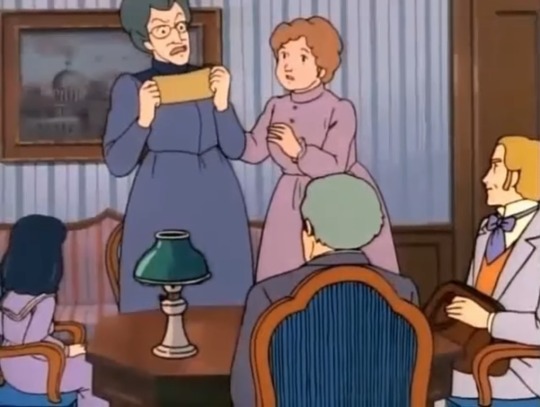
BACK TO THE CONCLUSION: Fortunately for Miss Minchin, Sara is kind and forgiving. She had Mr. Carrisford give a sizable donation to Miss Minchin’s seminary. Miss Minchin was a notorious penny-pincher, so this should settle her. Sara gets quite the happy ending as she gets to live with Mr. Carrisford and still go to school. She has Becky become her personal maid. All of Sara’s belongings that were taken away when Ralph died are returned to her on Christmas. A little starving girl she helped early in the series has a happy ending as well. And we end with Sara and her new family go back to India. It’s for 4 months to settle things on the Crewe estate, but she’ll be back.
At least when she comes back, Lavinia won’t be there. Good riddance! At least they come to some sort of truce.
No matter what version of A Little Princess you watch, it’s always going to be a tough watch. Because of the size of this series, it can sometimes be too hard to watch. Don’t get me wrong, I love a good story where a character takes on adversity and struggles. But there comes a time when struggle just becomes borderline torture-porn. You know those stories where the hero has to go through so much pain and agony and eventually get some sort of satisfied conclusion. The anime The Rising of the Shield Hero and the movie Precious comes to mind. Thank God Sara never had to endure what Precious did. Still bad though! At least with the movie adaptations to Princess Sara, we only watch Sara’s struggles for like, what, an hour or maybe less. This is over 30 episodes of watching this girl get abused. That’s 23 minutes per episode, mind you! Not just from Miss Minchin, but the cooks and one smarmy brat who has a vendetta. All the while, you’re telling yourself, “Dude, you know this story and it’s going to get better”. But it’s not an easy watch! There are scenes where you just wish they’d leave Sara alone or just wish for things to get better.
Is this my favorite adaptations of A Little Princess? Hmm…I don’t know! I really liked this version of the story, but I still have an attachment to the 1995 film. Granted, the animation is always a bit of a drawback when it comes to these animes. But I have to cut some slack as this was mid-1980s here. If you were a fan of this story, whether you saw the 1995 film, the Shirley Temple film, or any of the other adaptations out there, I give a recommendation. Track this down and give it a watch.
Okay Randomizer-kun, I’m giving you another shot. Please don’t give me an obscure hentai to watch in place of this.
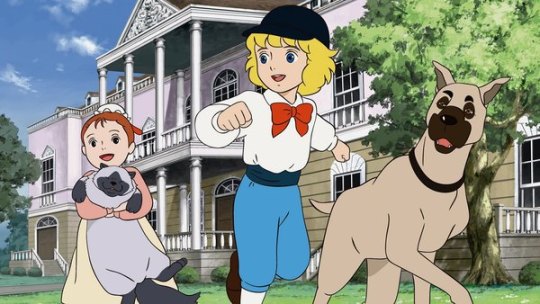
Oh thank God, another Nippon animation!
#anime review#a little princess#princess sara#sara crewe#ralph crewe#miss minchin#becky#amelia minchin#lavinia herbert#peter#a little princess sara
35 notes
·
View notes
Text
Versions of Treasure Island available at my library, ranked
because I read them all like some kind of freak and I need to share my thoughts on them!
(not including downloadable options, movie adaptations, or “sequels”)
This is going to be a really long post so I sure hope that read-more worked! Also, sorry about the image quality; I was trying to keep things from being gigantic and I don’t think I took a good approach. Okay here we go.
8. Scribner Storybook Classics series published by Atheneum Books imprint of Simon and Schuster, 2003 edition utilizing 1911 illustrations by N.C. Wyeth. Abridged.
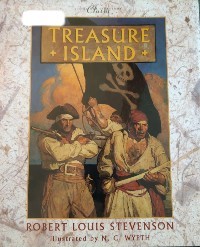
Wyeth is a very well-known artist, and he’s definitely talented, particularly with landscapes and clothing, but I find most of the human faces in this book pretty creepy. I also don’t like this abridged version of the text. I cannot stop thinking about the baffling choice to have Silver leave his parrot behind on the ship when he escapes. It’s also interesting to me that Silver literally never talks about Flint.

I will say that describing Silver as “one-legged (and two-faced)” was a little bit clever. This version might have ranked higher if it hadn’t had the misfortune of being the first one I read after embarking on this weird project.
7. Great Illustrated Classics edition published by Dodd, Mead & Company in 1985 with cover illustration by Stephen Moore and 12 engravings from an 1890 edition by assorted illustrators. Unabridged.


It’s the book. Whatever.
6. Usborne Young Reading Series Two edition published in 2007, abridged by Angela Wilkes, adapted by Sam Taplin, illustrated by Peter Dennis, with readalong CD read by Jonathan Guy Lewis.
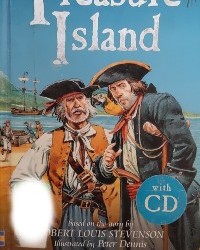
This is retold for a younger audience than any of the other versions on this list, so in a way I think it’s actually the most successful abridged version, because it feels like there’s a reason for it. Definitely a very simplistic take on the story, but I can live with it. I don’t love most of the illustrations, particularly the characters’ faces, which I think are kind of ugly and also pretty similar to each other. I do like these random birds, and this treasure hunt shot that would make a decent bookmark.
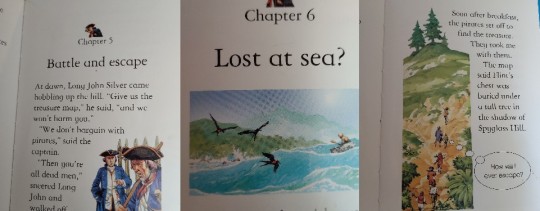
The (very dramatic) voices and sound effects on the audiobook are kind of entertaining.
5. Great Illustrated Classics (different series with same name) edition published by Baronet Books (Playmore Inc./Waldman Publishing Corp.) in 1989, illustrated by A.J. McAllister. Abridged by Deidre S. Laiken.

I’ve seen books from this series before, and they all have this same look, so my expectations were pretty much met. Mediocre paper. The cover is done by a different artist than the rest of the book. Very stark black and white pictures which are not really to my taste, although this one I shared on its own last week keeps sending me into hysterics.

I feel that the person who abridged this version did a better job than the Scribner one overall, which is not to say it’s without… quirks. Silver says he was quartermaster because of his wooden leg. A random background character’s name is changed for no apparent reason, and there’s a typo in the very same sentence. Silver is referred to as “evil” in the description on the back and as a “monster” within the text which is. something. On the other hand - and here’s another thing I can’t stop thinking about now - it’s implied that Silver has not only a wife but a FAMILY?!?! Also they add something about Jim selling the inn that’s not in the original.
4. Four Complete Novels: Treasure Island, The Master of Ballantrae, The Strange Case of Dr. Jekyll and Mr. Hyde, Kidnapped. Published by Arlington House Inc. in 1983, this edition by Gramercy Books (Random House) in 1995. Unabridged.

This has the same illustrations as the Dodd, Mead & Company version, but there are a few, like this one of Silver, that I’m pretty sure weren’t in that one.
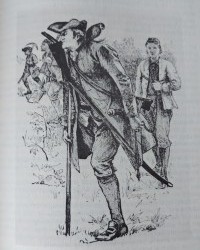
I think it’s nice having some other RLS books in the same volume.
3. Classic Starts version published by Sterling Publishing Co. Inc. in 2005, illustrated by Lucy Corvino. Abridged by Chris Tait.
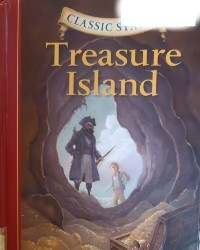
As far as abridged editions go this is a pretty good one. Nothing too remarkable, but they’ve very deliberately removed almost every mention of alcohol, which is an amusing censorship hill to die on given all the murder in the book. The chapter title “I Let Israel Hands Lend a Hand” is pretty funny. Silver admits that he’s afraid. “Silver still had his foot in both camps” is a kind of unfortunate figure of speech. There aren’t very many illustrations but they’re okay. I like this little parrot.
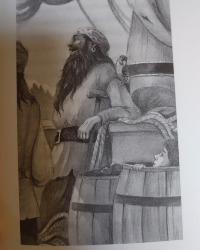
2. 1992 edition published by Viking/Penguin Books, illustrated by Robert Ingpen. Unabridged.
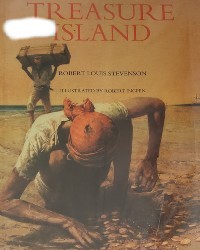
There’s kind of a range of artistic styles in here for some reason, so there are some illustrations in here that I don’t care for, but also several I really like. Silver usually looks like a kind old man.
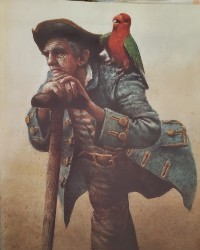
There’s a beautiful bird’s eye view of Bristol, an eerily lovely shot of the ship at the island, and a cute Cap’n Flint.

Also I assume this horrifying face is meant to be Flint’s ghost which I kind of hate but also think is kind of badass.
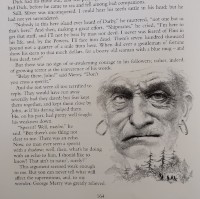
1. Usborne Illustrated Originals edition illustrated by Fran Parreño. Unabridged.
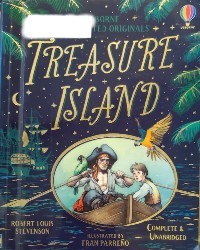
This edition is simple but charming. Uses the Blackadder ITC font for chapter titles and it looks like that font’s natural habitat. Book is a nice size and shape, cute cover. Art style, particularly the shots of ships and islands, reminds me a lot of some of debbiedart’s recent Black Sails paintings, except not as good. Most of the adult men (with the unsettling exception of Israel Hands) are pretty ugly, but I like how the artist draws Jim. I enjoy this dramatic Silver, although I’m not sure about the way the artist draws his crutch.

Major points in this version’s favor for illustrating my beloved “You’ve seen my snuff-box, haven’t you? And you never saw me take snuff; the reason being that in my snuff-box I carry a piece of Parmesan cheese – a cheese made in Italy, very nutritious” AND illustrating the sea lions. There’s also a shot of a shipwreck at the island that’s weirdly similar to the one in Black Sails.



Honorable Mention: A Clash of Steel: A Treasure Island Remix by C.B. Lee. Robert Louis Stevenson said “this is a book by, for, and about white British boys” and this author said “cool, what if instead it was about Chinese and Vietnamese girls and women and there was a lesbian romance in it.” I loved this book. It’s a total reimagining but it engages with the original in really interesting ways. The revelation that the [spoiler] character and the [spoiler] character are the same person was fucking brilliant.
If you’ve read this far, I hope it was at least a little bit interesting and/or entertaining. Let me know if you have any questions about any of these, because clearly I have lots of opinions. Also, if you have an edition you like that’s not on here, feel free to recommend it and maybe I’ll see if I can get my hands on it!
#Treasure Island#long post#I really don't know why I did this#and now I have all kinds of thoughts about how I would go about making my own version of it
5 notes
·
View notes
Text
Fine, I’ll recommend 10 movies
First, I absolutely love movies, and simply cannot rank my favorites. Thus, this will be in order of release. Second, I have way too many movies to recommend, so I will absolutely have to split these into categories. This list contains 10 animated (and one Claymation) movies I love and HIGHLY recommend.
1963- The Sword in The Stone - 1hr19min
This movie was produced by Disney, and is one of the many adaptations of King Arthur’s famous tale. I would truly like to believe this is the best retelling of King Arthur’s story, but it simply isn’t. (I am quite partial to the show Merlin) However, this is my absolute favorite movie version of King Arthur’s life, and it is one of my favorite movies to fall asleep to. The film is beautifully animated, whimsical, magical, and quite funny. I feel as though this movie has truly passed the test of time, and continues to be beloved among all ages. You can enjoy this with a Disney+ subscription.
1992- FernGully: The Last Rainforest - 1hr16min
I could talk about this movie forever. It was distributed by 20th Century Studios. This movie showcases how poorly we treat the environment and the people around us. With a hefty dose of humor, you follow a fairy and her friends around the Rainforest after they accidentally shrunk a human logger. You watch as the logger sees the harm in tearing down rainforests. “Will everyone become an environmentalist after watching this?” is probably what they were thinking when creating this movie, but with only a 63% on Rotten Tomatoes, I don’t think so. I do think its an early reason of my passion for Mother Earth though. You can find this film on Amazon Prime.
1995- Whisper of The Heart - 1hr46mins
Okay, so this movie and the next kind of go together, and I really recommend watching them together. This movie really struck with me when I watched it for the first time this year. It is a Studio Ghibli and Toho Co. movie. You follow a girl who is passionate about creative writing, and not very passionate about school. I have never seen such supportive parents portrayed in any movie, ever. The main character starts slacking in school once she decides that she wants to be an author, and her parents do their absolute best to support her in her decision. While finding inspiration, she wanders in to an old shop, and finds a small cat statue in a suit and she decides to write her story about him. There is a love interest in this movie as well, and he plays the violin and it is very very adorable. I love this movie so much for its soft romance, mild fantasy elements that keep you pondering about the world, and the absolutely amazing and supportive adults in the film. If you want to watch it, and you should, it is in HBOMax.
2002- The Cat Returns - 1hr15mins
The Cat Returns features the cat statue in Whisper of The Heart. It is also a Studio Ghibli and Toho Co. movie. It is best described as a wild adventure film. A girl saves a cat from being hit by a bus, and out of immense gratitude the cat stands up and gives his thanks. The father of this cat, who is the Cat King, is so grateful the young girl saved his son (the Cat Prince) that he invites her to The Cat Kingdom and wants her to marry the prince.. his son.. who she saved... who is a cat. I do not know what to say to convince you to watch this movie other than talking cats and a portal to a cat world, but it was one of the weirdest hours of my life, and I have since rewatched the movie quite a few times. You can find this movie on HBOMax as well, and PLEASE watch it RIGHT AFTER Whisper of The Heart.
2005- Robots - 1hr31mins
From Blue Sky Studios and 20th Century Fox, Robots is one of the best Kid’s Animated movies of all time. It is so funny, all about how horrible capitalism is and how capitalism ruins families, lives, and dreams, AND has one of the best casts of any animated film.... ever. Starring Ewan McGregor, Robin Williams, Mel Brooks, Jennifer Coolidge, Amanda Bynes, Stanley Tucci, and Halle Barry, you know you are fully set up for a good time. The attention to detail in this movie is fantastic, and I notice something new every time. I used to watch this movie over and over again, and I still watch it in my 20s and laugh. It features a perfect mic of adult humor and kid humor, and mixes real themes like poverty and capitalism with toilet humor and boy talk. Not to mention the great soundtrack. I watch this movie when I am in need of a good laugh, no-stress, and nostalgic time. You can watch this movie on Hulu, and you should probably do it right now.
2006- Over The Hedge - 1hr27mins
I watch this movie for many of the same reasons I watch Robots. Over The Hedge is a Dreamworks Pictures, Paramount Pictures, Warner Bros., and Columbia Pictures film, and you can tell. It has all the charm you expect from Dreamworks, and all the laughs and hidden themes you could want. This is probably another reason for my love of animals and the earth. The film pokes fun at humans and overconsumption, while following a raccoon who got caught stealing from a bear. A beautiful ‘found family’ trope is exactly what we all need right now. Unfortunately, this movie is not on any streaming platforms, but you can rent it on Amazon or Youtube for $3.99. It is totally worth it.
2009- Coraline - 1hr40mins
Everyone knows Coraline. A Laika Studios, Universal Pictures, and Focus Features film that scared the sh*t out of kids across the world. I have personally always loved this movie, and my older sister hated me for it. She thought it was terrifying, oh well! Directed by Henry Selick, who is phenomenal, and starring Dakota Fanning, you get to enter a world where everything is wet, parents ignore you, and nothing is as it seems. When a neighborhood kid finds a doll in his house that looks exactly like Coraline, she makes fast friends with the doll and discovers an old bricked up door that turns into a portal to a new, but very familiar world. In this new world, she meets her Other Parents, who pay attention to her, cook great meals, and give her gifts and mango milkshakes. She travels to and from the worlds with ease, and even tells her original parents of the world, but they don’t believe her. When her Other Parents ask her to stay in their world, little Coraline has to make a quick decision to stay and give the Other Mother her eyes, or leave... if she can find her way back out again. I have written too much on this movie considering everyone has already seen it, but I urge you to rewatch it and pay attention the the small details the film crew worked so hard to make perfect. I promise you’ll notice something new. You can watch Coraline on Tubi.
2011- From Up On Poppy Hill - 1hr31mins
Yet another Studio Ghibli movie! Studio Ghibli truly has always had animation figured out. This movie has been stuck in my brain since I first watched it. I only watched it for the first time a few months ago, but I have rewatched this movie at least 4 times since. From Up On Poppy hill opens with a young girl explaining that she has a lot of responsibilities at home, because her father has been missing since she was very little, and her mom is in the US for school. We get to watch her take care of the boarders in her home, and see her relationship with her grandmother, and learn about why her father is missing. One day the club next to her school has sort of a protest, because the big capitalist jerks in the city want to tear down and repurpose the space that the kids love and cherish. Anywayyyys, she meets the leader of that club and starts spending more of her time there, and stops completing all of her responsibilities at home. Again, thank you Studio Ghibli for giving us such kind and supportive adults in your films, because her grandmother just wants the best for her. The romance aspect from this film is really what threw me for a loop, and it was a little more than a “will they, won’t they” situations. More like a ���can they, can’t they” type things. I loved it, and it has quickly risen to the top standings of my favorite animated films. You can watch it on HBOMax, along with most other Studio Ghibli movies.
2011- Gnomeo & Juliet - 1hr24mins
I am not sure how they got an hour and a half into this movie, but it is animation gold. I love gnomes, and I love TouchStone and Disney, so this movie is everything I could ever want. I firmly believe that Gnomeo & Juliet is the BEST rendition of Shakespeare’s classic tale, even better than the original. It is fun, filled with humor and fake teenage drama. It very much gives “BUT DADDY I LOVE HIM” vibes, ya know?? Anyways I watch this movie when I am absolutely incapable of watching anything new or even slightly stress inducing. If you need to just chill out and be a kid again, this is the movie for you. You can watch it on Disney+.
2012- The Lorax - 1hr26mins
Okay, fine so I lied. I can sort of rank my favorites. The Lorax is my all time favorite animated movie. With a superb star-studded cast of Danny Devito, Zac Efron, Taylor Swift, Betty White and Ed Helms, you just CAN NOT miss. A lot of kid’s first real step into the harms of capitalistic greed and corporate harm to the environment, it’ll get you riled up for Mother Earth and ready to overthrow the capitalist pigs who keep tearing down our forests and dumping oil into our oceans. Made my Universal Pictures and Illumination, you follow a young boy pining after a girl, and all the girl wants is a real tree. But how are they going to get a real tree when they live in an overpopulated, over polluted, and completely plastic world? All the trees have seemingly gone extinct, and all that’s left is plastic, rubber, oil, grease, and grime, and the mayor of this town is hellbent on keeping it that way. Anyways, a twist on the classic story by Dr. Seuss has become my most rewatched movie ever. When they took it off Netflix, I truly threw a tantrum. Anyways, I now own this movie on different platforms and DVD and Blue Ray. Not to mention that freaking amazing sound track! I bump and jump and sing to ‘How Bad Can I Be?’ on the daily. You can watch it with Peacock Premium.
So, there you have it. My must watch list of animated movies and where to find them. Let me know if you also love these, and if you hate them... don’t tell me because I am sensitive lol. Ciao!
3 notes
·
View notes
Text
January Book Roundup

The Commodore (”Aubrey & Maturin”, book 17) by Patrick O’Brian, 1995 ★★★☆☆
I had more fun with The Commorodre than The Wine-Dark Sea, but not enough to make it all the way to four stars. Jack and Stephen are back in England with all the domestic strife that entails. While I got into the series for the navel adventure, the personal relationships that anchor the novels are what keep me coming back and boy howdy does this one have plenty of that. The book also has plenty of navel action, a good bit of espionage, and a significant digression to acknowledge the horrors of the transatlantic slave trade. Another perfectly acceptable book and I’m excited to read the next one.

Leviathan Falls (”The Expanse”, book 9) by James S. A. Corey (Daniel Abraham & Ty Franck), 2021 ★★★★★
For unclear reasons, it took my local library an entire year to get a copy of this one and another two months for me to get my hands on it. Thankfully, it was entirely worth the wait. The final volume of “The Expanse” has all the exciting space action and well observed human drama that made the series so beloved. Not only that, it manages to wrap up the story of the Rocinante and her crew in an extremely satisfying, narratively symmetrical way. As for the plot... gang, this book has EVERYTHING: Malevolent interdimensional dark gods, an ex-Martian space emperor trying to do an “End of Evangelion”, ancient alien history lessons, and a Good Dog who doesn’t die (technically). I obviously can’t recommend the last book to anyone who might be curious, but the series in aggregate gets a hardy endorsement.

What Moves the Dead by T. Kingfisher (Ursula Vernon), 2022 ★★★★☆
I picked this one up knowing exactly two things: My wife enjoyed it and what the cover looked like. Based on this information I was expecting some seriously spooky eco-horror. I was less than a page in when I discovered it was a retelling of “The Fall of the House of Usher” and adjusted my expectation to a story trading in gothic dread. And there is a good deal of both those things, but it was all filtered through a narrator who felt like a comic relief character who wandered in from a different story. What Moves the Dead is a strange piece that I never managed to get completely into, but it has a spectacular voice to it. This one gets a recommendation, but I’d give it a coin flip if the average reader bounces off or becomes completely absorbed.

Sea of Tranquility by Emily St. John Mandel, 2022 ★★★★☆
Don’t let the time travel, the people from the moon, or the majority of the book taking place in the future trick you: This is literary fiction, not science fiction. Not even what Margaret Atwood insists on calling “speculative fiction”, this is all literary all the way. I’m not much of a literary guy most of the time. If you aren’t going to keep me interested with cool sword fights or dope spaceships, I’m going to need the writing, themes, and structure to be perfect. And the book almost was perfect, bar one slight stumble at the end when a character says the theme of the book directly to the audience. I’m probably being churlish knocking a whole star off for that, but reviews are always subjective. To give you an idea of how perfect the book is otherwise: One of the characters is an author expy on book tour to promote her pandemic novel that was recently adapted to a popular film only for the tour to be interrupted by an actual pandemic and I didn’t immediately close the book with a sigh. This one gets the strongest possible recommendation to anyone with a passing interest in literary fiction (who have probably already read it). If you’re not usually a literary fiction person, I’d recommend this to you, too. Just know that if you find it a bit dull, that’s entirely your fault.
By the Numbers:
Total Books: 4
Genre: Historical Fiction (1), Science Fiction (1), Horror (1), Literary Fiction (1)
Decades: 1990s (1), 2020s (3)
Author Stats: Women (2, 50%), POC: 0 (0%), Queer Authors: 1 (25%), Living Authors (3, 75%)
I keep saying “kinda light month” after reading four books, but after three months I’m forced to confront the possibility that I’m a “four books a month” guy. Would have been five if the library app hadn’t torn a book from my hands when I had less than 10% to go, but that’s life sometimes. I’m sure I committed some great sin to cause that reversal of fortune.
Also a much bigger percentage of books from this decade than in previous months, which is always nice. And if I can finish The World We Make before the loan expires in 7 days, next month I’ll finally have something other than a 0 for POC authors.
Have you read any of these? I’d love to hear your thoughts and experiences. But please don’t tell me what to read next. I have so may books to read, gang. Please don’t stack that tower any higher, I’m begging you.
#books#reading#the commodore#aubrey maturin#patrick o'brian#leviathan falls#the expanse#james s.a. corey#daniel abraham#ty franck#what moves the dead#t kingfisher#ursula vernon#sea of tranquility#emily st. john mandel
0 notes
Note
Which classic lit adaptations capture what you specifically enjoy about the original books?
This is a hard question. I know what my favourite adaptations are but saying what they capture is a little harder.
My favourite classic lit adaptation of all time, bar none, is A Muppet's Christmas Carol. But you have to find the original version where The Love Is Gone song is maintained (my poor VHS eventually died) I'm not sure what that says about me, but I watch it every Christmas Eve. I feel like it really captures the pathos you are supposed to feel for the Cratchit family and Scrooge has a very believable redemption arc. It also does this wonderful job of showing how Scrooge has been missing out on joy. But that book is not one of my favourites... (I think I’ve read it once)
I actually think the more I love the original work, the less I like the adaptations. Because it is so hard for a movie to capture the whole story and it’s hard even for a mini to show every facet of the characters. I love Mansfield Park and I think a lot about the characters, so I wonder if any adaptation could sufficiently capture them in a way that would satisfy me!
Which is not to say that I don’t appreciate Classic Lit adaptations, I do! I really love some of them. Pride & Prejudice 2005 is what brought me to Jane Austen. But I also think they create misconceptions of the characters because inevitably a character gets flattened when you move from text to the screen. There is just so much richness in these amazing books, which is why they are so popular today, that doesn’t translate to film.
A Christmas Carol might work so well in adaptations because it’s short, it has a strong moral message, the characters aren’t terribly complex, and the message is still relevant today. But how to translate Mansfield Park, with it’s largely silent heroine, or The Tenant of Wildfell Hall, which explores a very destructive but not very visual form of spousal abuse, those are tricky! And I think it’s very hard to turn these longer books into a comprehensive movie, though it has been done well.
Jane Austen’s text are also tricky because part of what I love is the narrator ripping her own characters to shreds and making super sassy and sarcastic comments and that just doesn’t translate to screen at all. But I also love the strength of her female characters against a society that expects them to do impossible things, like choose to love but also marry with a competency. And I think the movies have trouble explaining how tricky it is for women to walk that line between prudence and avarice.
Anyway, this question is hard because I have a difficult time saying what exactly I specifically enjoy about my favourite classic literatures.... Like I just read Wives & Daughters by Elizabeth Gaskell and I LOVED IT. But I don’t think I actually can tell you what exactly I liked, I just wanted to keep being with Molly and living in that novel. I don’t know why I love Jane Austen so much, I just do.
So I think I tend to like bits of things, like how Northanger Abbey 2007 really got Henry Tilney and John Thorpe spot on, but there were other things I think fell short especially within the time constraints. And Emma 2020 and Clueless I really love how they do Emma, even if the story isn’t perfect there either. And Sense & Sensibility 1995 really did a perfect Willoughby for me, even if other elements bother me, like Elinor being far too old.
I hope that was kind of an answer.
#classic lit#classic lit adaptations#a muppet christmas carol#question response#jane austen#charles dickens#anne brontë
14 notes
·
View notes
Text
Jane Austen ranking (with a few spoilers)
Jane Austen is one of my mother’s favourite authors, as well as one of mine. My story with Jane Austen begins in 1995 when I was 18. I had refused to follow my mum’s recommendation to read Austen for a handful of years. But then the BBC adaptation of Pride and Prejudice starring Jennifer Ehle and Colin Firth happened. I was too impatient to wait six weeks for the ending so somewhere in there I read the book, and then continued watching the show. I followed that up with reading Sense and Sensibility, Emma and Persuasion. A couple of years later I also read Mansfield Park and Northanger Abbey.
When I was a bit under the weather a couple of days ago I fell down a YouTube hole where I watched a bunch of people ranking the six finished Jane Austen novels. And that got me thinking about what my ranking would be. This is how I would rank them today, from 6 to 1.
6 Northanger Abbey
Northanger Abbey is the only one of Austen’s novels I’ve only read once. It was a long time ago, so I don’t remember that many details of the book. I know I didn’t hate it or anything, but I’ve never really felt the impulse to pick it up again. Maybe because I find second hand embarrassment quite excruciating, and I think there were a few situations that could cause that.
5 Sense and Sensibility
This was the second novel I read in my teens, I believe and I loved it. And I still do, but I would be more likely to pick up the other four higher on this list if I were to reread an Austen today. I’m the eldest child and I do identify with Elinor when I read it and tend to get a bit impatient with Marianne.
4 Emma
We’re back to second hand embarrassment, I find the scene where Emma is so cruel to Miss Bates very difficult. But there is a lot to love about this novel as well. And a lot of fun. I also think this is the novel that I reread latest, maybe 5 years ago.
3 Mansfield Park
I’m an introvert, and did not grow up in a rich family. So I quite easily identify with Fanny. I like that she keeps to her principles. Also, there is a YouTube modernised vlog-type series called From Mansfield with Love which I really recommend. It’s quite long, but I remember loving it.
2 Pride and Prejudice
The first Austen I read, the first adaptation I watched. I love this! Lizzie and Darcy are great and I love their arc and their romance. The 1995 BBC version is still my favourite adaptation, though I should probably mention The Lizzie Bennet Diaries as well. I have seen every episode in every little spin off, and I’ve seen the 100 episodes in the main show 3 or 4 times.
1 Persuasion
While I wish I could be witty and lively like Lizzie, I can truly identify with Anne (the being shy part, not the awful family part). I love her, and I love how she’s a good person even though her family’s pretty awful. And I love Captain Wentworth, and how they find their way back to each other.
#Jane Austen#persuasion#pride and prejudice#sense and sensibility#Emma#northanger abbey#mansfield park
0 notes
Text
My Thoughts on Pride & Prejudice 2005: Style over Substance
Kicking off my Pride and Prejudice adaptation review series with the most popular of all the adaptations: the 2005 movie. This film stars Keira Knightley as Elizabeth Bennet and Matthew Macfadyen as Mr. Darcy.
1. GENERAL THINGS I LIKED
The cinematography and the soundtrack. Every shot is a painting, especially with the gorgeous landscape scenery. The music is beautiful and dreamy; I have listened to the soundtrack more times than I've watched the film. Both the cinematography and the soundtrack effectively transport the viewer back to the film's romanticized version of "the past," when life was simpler and people lived slower lives, waiting for their Mr. Darcy to sweep them off their feet.
Originality. The film takes a unique approach to the story by focusing mainly on the romance between Darcy and Elizabeth and emphasizing how the natural surroundings reflect the characters' mental state/emotions (pouring rain during the first proposal and stormy skies when Elizabeth hurries home after Lydia runs away). Though one can disagree with the creative changes made, I like how this film isn't just a remake of what came before it.
Elizabeth's walks through the countryside. The film expresses her desire for freedom through her countryside walks. For instance, the Netherfield walk is shocking to Caroline Bingley because it demonstrates Elizabeth's independence.
The comedic parts are great thanks to the creative additions made. For example, the "excellent boiled potatoes" joke isn't in the book, but it perfectly exemplifies Mr. Collins' poor social skills and pretentiousness, as he tries to make an overly formal comment about an otherwise mundane dish.
2. THE CASTING
The acting is good, although I don't always agree with how the characters are portrayed.
Keira Knightley. I like how she's the right age for Elizabeth, who is around 20-21 years old; Knightley was around 19-20 when she played Elizabeth, plus she has gorgeous eyes. She perfectly conveys the pride, confidence, and biting wit of Elizabeth, as she holds her head high in an imperious manner and has a direct, piercing gaze. However, I don't like how this version chooses to simplify Elizabeth's character into that of "free-spirited nonconformist tomboy," who is a nature-lover and runs to the countryside to console herself when things get tough (ex. running to the lake after rejecting Mr. Collins). This is a contrast to the Elizabeth Bennet as presented to us in the book, who acts like a typical "lady" for the sake of her social reputation; she mostly keeps her thoughts to herself except when talking to Jane or Darcy. Elizabeth is powerful not because she rejects society outright; it is because she does not submit to societal pressure to marry and makes her own choices (ex. rejecting Mr. Collins).
Matthew Macfadyen. His Darcy is cold, aloof, and remote, yet shows signs of a rich inner life and unrequited yearning for Elizabeth as a soulmate. I like how this version shows Elizabeth peeling away his cold exterior like the layers of an onion, until his heart of gold is revealed. While I think Macfadyen is a good actor, I disagree with the interpretation of Darcy solely being a lonely introvert, as it neglects his primary character flaw of pride.
Tom Hollander's Mr. Collins. Probably the best casting, as he perfectly portrays the bumbling awkwardness of the character and is more sympathetic than the gross Mr. Collins in the 1995 BBC miniseries. He is short, has a nasally voice and officious manner that makes him annoying yet fun to watch.
Simon Woods as Mr. Bingley. He's so friendly and eager to please, like the character is in the book.
Rosamund Pike's Jane Bennet. Utterly angelic and motherly, need I say more? The perfect antidote to Elizabeth's savagery.
Rupert Friend's Mr. Wickham. Handsome and dashing in a red soldier's uniform. It's easy to see how a girl would fall for him and ignore his debauchery, but also obvious that he is deceptive. For instance, he keeps claiming that he is insignificant and unnoticed, when he basks in the attention of Elizabeth, Kitty and Lydia.
3. OVERALL CHARACTER AND PLOT DEVELOPMENT
Since this is a movie, character development is a challenge, and the film relies on changes of outward appearance/dialogue to show character growth. For instance, we get to see Darcy's change from cold and remote into warm and loving, while Elizabeth admits that "she was wrong" about Darcy and slowly comes to respect him.
The first half (beginning to Darcy's proposal) is great because it effectively introduces the audience to the cast of characters (the family, Darcy, Bingley, Caroline, Wickham, and Mr. Collins). It also contains all the comedic parts and sets up the conflicts that drive the story. Overall, this half is more faithful to the novel because it has the social satire aspects of the story and sticks to the key plot points while developing the characters.
The second half is rather lackluster compared to the first because it focuses solely on resolving the plot points introduced in the first half. This part of the book contains important events for Elizabeth's character development (getting the letter, visiting Pemberley, dealing with the fallout from Lydia's elopement), but the film rushes through them to get Elizabeth and Darcy married. Instead of focusing on how Elizabeth overcomes her prejudice of Darcy and starts to love him, the film relies on aesthetic shots of flickering candles/landscapes to serve as quick transitions between the scenes. Though we have plenty of evidence that Darcy loves Elizabeth, we don't see much evidence that the love is mutual until the second proposal, only that Elizabeth starts to see him as a friend.
Another reason I don't like the second half of the film as much as the first half is the reduced dialogue. This second half has a lot of quiet moments devoted to nature scenery/Elizabeth staring in the mirror. Reducing the dialogue, with the exception of the letter scene, doesn't make sense because the plot/action of Pride and Prejudice is furthered through the conversations the characters have (after all, wealthy Regency women likely spent much time indoors/making social calls). While one can argue that the reduced dialogue is meant to show that Elizabeth is reflecting on her mistaken prejudice, without access to Elizabeth's interior thoughts, the audience doesn't get to see Elizabeth actively confronting her false assumptions about Darcy, unlike in the book, where she says out loud to herself: "Until this moment, I never knew myself."
Notable Scenes From the First Half of the Film:
The opening scene. It sets the tone for the whole movie with the beginning shot of a field at dawn, which ties in nicely with the second proposal scene near the end. By presenting Elizabeth by herself reading a book, it communicates to the audience that Elizabeth is "not like other girls," and it shows the imperfect, yet loving family dynamics of the Bennet household.
Elizabeth roasting Darcy after he dismisses her as "tolerable, but not handsome enough to tempt me." During a conversation the Bennet family has with Darcy and Bingley, Mrs. Bennet commits a social gaffe when talking about Jane's many admirers and how one sent her poetry. Elizabeth saves the situation by commenting that bad poetry can kill love, and Darcy comments that he regards poetry as "the food of love" and asks how to "encourage affection." I like that the film included this little exchange from the book (although it takes place while Elizabeth is visiting a sick Jane at Netherfield, and not during the first ball), since it was skipped over in the 1995 miniseries. The best part is Elizabeth's sick burn: "Dancing. Even if one's partner is barely tolerable," which is made even better when she walks away from him with a triumphant smile on her face.
The famous Hand Flex. After Darcy helps Elizabeth into the carriage (by holding her hand) so she and Jane can head back home, he glances longingly at her before wringing the hand with which he touched hers. It's an important hint of his growing love for her, as well as his struggle to repress those feelings. This is a wonderful bit of character development as it reveals that Darcy has a heart.
Mr. Collins having a meal with the Bennet family. The awkwardness is palpable as Mr. Collins tries to show off his social skills and give pro tips on charming ladies. This is all topped off with this amazing comedic joke: "These are excellent boiled potatoes. Many years since I've had such an exemplary vegetable." Another brilliant bit: after Lydia cannot contain her laughter, Lizzy, after giving her father a mischievous side-eye, slaps Lydia on the back to hide her laughter. Best line besides the excellent boiled potatoes: "Believe me, no one would suspect your manners to be rehearsed."
The Netherfield Ball dance between Darcy and Elizabeth. It is staged like a clash of personalities in the beginning, while the creative filming technique of separating the couple apart from the crowd of dancers foreshadows the budding relationship between them. I also like how sarcastic the dialogue is--Elizabeth is trying to win a battle of wits with Darcy but he successfully avoids her traps while reminding her that she doesn't truly know him and cannot make judgements about his personality.
Mr. Collins trying to introduce himself to Darcy. It's so comical because of the significant height difference between Mr. Collins and Mr. Darcy (Collins is dwarfed by Darcy). The height difference effectively represents the significant difference in social status between the two men and makes Collins, with his pomposity, look ridiculous as he fancies himself part of the nobility but cannot properly introduce himself.
Mr. Collins' proposal--one of the funniest scenes in the movie. Mr. Collins clumsily tries to flatter Elizabeth with a tiny flower, and it gets even funnier when he so obviously misreads Elizabeth's disinterest and outright exasperation (he doesn't understand that no means no!). After Mr. Collins bends down on one knee to propose to Elizabeth, the film emphasizes Elizabeth's towering presence over Collins to show that the two are a mismatch. The fact that the proposal takes place in the messy dining room reflects Collins' view of marriage as a business matter that he wants to get done with quickly, since the location of the proposal is not very romantic.
Elizabeth roasting Darcy yet again at Rosings Park. Elizabeth eagerly recounts to Colonel Fitzwilliam Darcy's impolite manners at the first ball; Darcy confesses that "I do not have the talent of conversing easily with people I have never met before." I like how the nervous and quiet delivery of that line shows to the audience that Darcy is an introvert, and it shows that he's an honest person, since he abhors "disguise of every sort." The scene effectively highlights Elizabeth's prejudice towards Darcy as the audience feels pity for him when Elizabeth tells him to practice.
"This is a charming house." During this scene, Darcy visits Elizabeth while she is alone and awkwardly attempts to make conversation with her. Macfadyen is a master of body language; Darcy says little but expresses a lot (ex. the nervous fiddling with his gloves). He tries to express his feelings for Elizabeth but gives up and abruptly walks out of the room.
The first proposal. What a climactic scene (but not very faithful to the book)! The music, thunder, and rain perfectly complement the volcano of emotions that erupts when Darcy cannot repress his feelings any longer. This scene has some of the best sexual tension ever; the two get closer to each other until they almost kiss. While this scene is great to an objective viewer, I don't like that the modified dialogue changes the original meaning of this scene (more about this later).
The letter. Elizabeth has a moment of introspection when she is forced to question her judgment, and Darcy delivers his letter. I like the shot of Darcy riding farther and farther away from Elizabeth, signaling that he is becoming increasingly out of her reach.
Notable Scenes from the Second Half of the Film:
Aunt and Uncle Gardiner arrive right after Elizabeth comes back from Rosings and they take her away to a vacation. I didn't like how they were introduced too quickly; I was thinking to myself "how did they get there and where did they come from?" Luckily we are treated to more glorious shots of the English countryside (the one with them under a large oak tree is my favorite).
Visiting Pemberley. I was puzzled by why Elizabeth laughs as soon as she sees Pemberley for the first time because in the book she was in complete awe of it. Also it doesn't make sense why she would touch his expensive stuff it's not her house...or is it? The good thing is that the embarrassment the two have upon meeting each other again is definitely palpable. Georgiana is sweet, but a little less shy than she was in the book.
Darcy smiles! After introducing Georgiana to Elizabeth, he smiles for a brief time at Elizabeth, and she smiles back. It's a great moment showing how Elizabeth has drawn out his goodness, and indicates that Darcy has transformed for Elizabeth. She also starts seeing him as a friend and her prejudice against him seems to have reversed in this moment of mutual recognition.
Lydia's elopement. Keira Knightley's fake cry was off-putting. Then Darcy only talks to her for a little bit and doesn't help her much (unlike in the book, where he asked her to sit down and got her some wine to make her feel better). I don't know why the aunt and uncle are in this scene because it's very important in developing Darcy and Elizabeth's relationship. In the book, the two are alone, and Elizabeth choosing to tell Darcy about Lydia's elopement is a sign that she trusts him, while Darcy's concern for Elizabeth further confirms that he still loves her. This extremely brief scene flickers quickly, and it takes only a few seconds before Elizabeth is crying in her carriage, while the sky is dark and ominous.
Bingley rehearsing his proposal with Darcy. This added scene, which is not in the book, is so funny because of how Darcy roleplays Jane, while Bingley has so much anxiety about her not accepting him. It's a nice glimpse into their friendship and it's also funny because Bingley is getting proposal advice from someone who failed very miserably at proposing.
Sunrise on the Moors. Another objectively beautiful and romantic scene that is definitely not faithful to the book. The two meet each other in a field in their nightgowns and profess their love to each other while blessed by the rising sun.
4. MAJOR FLAWS; OR, HOW THE FILM DIVERGES FROM THE BOOK
In earlier book adaptation reviews, I stated that I welcomed creative changes as long as they reflected what was already in the book (ex. literary elements and character development) or the author's intent, since film and books are different mediums and some storytelling techniques that work in books may not work on film. This movie is undoubtedly well-known for its creative changes, especially in terms of historical setting and dialogue. While these creative changes entertain the audience, I feel that they change the meaning of the story as presented by the book.
Here's the biggest issue I have with the movie: Darcy has no pride. The film interprets his "pride" as a misconception strangers get from Darcy's cold manner and inconsiderate remarks, but in the book he is an arrogant person who views his social inferiors as beneath him and treats them poorly. In the movie, his whole character is fashioned in the modern image of the "sensitive man," who is kind and considerate if only the outside world would appreciate his uniqueness. Thus, Elizabeth's prejudice against him is entirely without merit. While making Darcy a more sympathetic person highlights how wrong Elizabeth's prejudice is, the fact is that both of them have "pride and prejudice." Some fans have commented that Darcy is like a sad puppy at times. It's hard to see how he's a good match for this Elizabeth's fiery spirit, only that he wouldn't infringe upon her freedom to roam. A lot of YouTube comments I read were people expressing their desire to "hug Darcy" or console him after Elizabeth rejects him; this doesn't make sense because Darcy is an unsympathetic character until he is forced to change in order to earn Elizabeth's love. Apart from becoming kinder to Elizabeth and the Gardiners, Darcy never really changes in the movie; he still remains a socially awkward introvert.
The re-interpretation of Pride and Prejudice as purely a romantic novel: The emphasis on romance means that the other elements of the book--the social criticism, secondary characters and the dialogue--are de-emphasized for the sake of the romance between Elizabeth and Darcy.
The film's approach to the story echoes Charlotte Bronte's criticism of the novel: "And what did I find [in Pride and Prejudice]? ... a carefully fenced, highly cultivated garden, with neat borders and delicate flowers; but no glance of a bright, vivid physiognomy, no open country, no fresh air, no blue hill, no bonny beck. I should hardly like to live with her ladies and gentlemen, in their elegant but confined homes." This version of Pride and Prejudice utilizes Romantic elements not in the book (ex. the storms, the landscapes) to increase the passion that the characters feel but cannot express.
Pride and Prejudice is perceived as a "boring" book because much of the drama takes place indoors (ex. Darcy's first proposal is in Mr. Collin's home), whereas in the film, there is greater emphasis on the natural scenery in keeping with its Romantic interpretation (lots of the "open country" that Charlotte Bronte desired). While the landscape scenes are beautiful, locating the action indoors, in the grand houses of the nobility, emphasizes the repressive, tradition-based nature of Regency Era society that Austen criticized (in a subtle way). These houses reinforce social hierarchy, for instance; the interior of Rosings Park is showy and stifling because it it represents Lady Catherine De Bourgh's wealth and power over those around her. Locating most of the scenes indoors visually represents the "confined and unvarying" lives of Regency era women and makes Elizabeth Bennet's independent streak much more significant.
Some of the social constraints that Elizabeth and Darcy face are removed. For example, Elizabeth is much more direct in her criticisms of others (ex. the "barely tolerable" insult), whereas in the book she largely confines these criticisms to her intimate friends such as Jane and Charlotte Lucas. While this effectively shows how badass she is, Elizabeth likely would not have taunted Darcy in such a direct way, as it would have been considered impolite and likely harmed her social reputation in a society governed by rigid adherence to social etiquette. And of course, Darcy likely would not have been walking around the English countryside in an open-chested shirt although we may have Colin Firth's wet shirt to blame for that. The importance of following etiquette rules is shown when Darcy offends the whole village by refusing to dance with anyone during the first ball. As a woman in a patriarchal society, it would have been even more important for Elizabeth to follow the rules, as her social reputation was important to her chances of making a good marriage. By de-emphasizing the rigid social norms that govern the characters, the obstacles to Elizabeth and Darcy's marriage are less significant, and it seems that the only thing standing in the way of their being together is Elizabeth's unreasonable hatred of Darcy.
Also, in many of Austen's novels, the hometowns of her heroines and its inhabitants are their own characters; the power of gossip in determining one's social reputation for the "marriage market" is de-emphasized in the film. In Pride and Prejudice, a major reason Elizabeth doesn't discover Wickham's bad character at first is because of the "general approbation of the neighborhood" and social popularity he has in Hertfordshire. After Lydia elopes, the family is in a bad situation with regards to marriage prospects because the village had "generally proved [the Bennets] to be marked out for misfortune." In the film, the role of the village is relegated to that of a place for entertainment and nothing more.
Others have noted that the film also exaggerates the social divide between Elizabeth and Darcy by turning the Bennet family into peasant farm-owners who have messy hair and wear plain, homespun clothing. This justifies Darcy's social prejudice against the Bennets, which undercuts Austen's message of morals, actions, and treatment of others being a better indicator of character than class rank (the rich people in this book, with the exception of Darcy, Georgiana and Bingley, are shown to be lazy or plain ridiculous). While Darcy may be richer than Elizabeth, and have better connections, they are both members of the gentry--after all, they do not have to work to maintain their lifestyles. Instead, we are presented with a conventional rags-to-riches story, where our poor but virtuous heroine is rewarded with a rich Prince Charming who takes her away from the squalor of her home to his great big palace.
Ultimately, the story is changed into an argument for love, specifically the passionate kind, triumphing over all; Elizabeth overcomes her hatred of men as "humorless poppycocks" to be with Darcy. Near the end, Mary reads out of a book claiming that a lady should give in to her passions and surrender to love, which doesn't make sense as the marriage based entirely on passion (Lydia and Wickham) is shown to be less than ideal.
While Austen does believe in following one's heart (ex. Persuasion, where Anne Elliot regrets rejecting Captain Wentworth because of his lower social status), others have commented that she presents the ideal relationship as a balance between mind and heart. Charlotte's practical marriage to Mr. Collins represents the traditional view of marriage as an "economic proposition," it is entirely logical and calculated, whereas Lydia and Wickham's marriage is the other emotional extreme, motivated entirely by sexual infatuation. Before Elizabeth acknowledges her love for Darcy, she must respect him as her intellectual equal. Here's the passage from the book where Elizabeth realizes she loves Darcy: "She now began to comprehend that he was exactly the man, who in disposition and talents, would most suit her. His understanding and temper, though unlike her own, would have answered all her wishes. It was an union that must have been to the advantage of both; by her ease and liveliness, his mind might have been softened, his manners improved, and from his judgment, information, and knowledge of the world, she must have received benefit of greater importance." Elizabeth's decision to marry Darcy is not only a result of her heart's desire, but it comes after she does some thinking and concludes they are compatible and would be able to live with each other on a day-to-day basis.
Something else I find ironic is the director's (Joe Wright's) claim that he aimed for realism in the film, given that Austen already depicted Regency era life realistically by focusing on social norms, class, and wealth:
The director, in his quest for "realism," features the messy environment of the Bennet household, which doesn't make sense given that they are still relatively wealthy (when defending herself, Elizabeth tells Lady Catherine that she is "a gentleman's daughter"). Also, they have servants to clean things up, so why would the house be in a constant state of disarray?
Lastly, how is the second proposal scene is "realistic?" It is a moment of "psychic communication" between Darcy and Elizabeth which is out of character for the book. They both "can't sleep" and walked, in the words of Wikipedia, "across the moors" to see each other ok this seriously reminds me of Wuthering Heights. The scene is powerful because every woman wants to be told that "you have bewitched me body and soul" but "realistically," this doesn't happen (and this line isn't in the book either).
"REALISM" IS THE REASON WHY WE FUSS OVER HISTORICAL ACCURACY!!! HISTORICAL ACCURACY ALLOWS PERIOD DRAMAS TO BE REALISTIC!!!!
If the characters wore historically accurate clothing (different from the loosely inspired, modernized dresses/hair in the film), it would have emphasized the lack of freedom women had in Regency Era society and reinforced the importance of following social norms to succeed in a patriarchal society.
Bad Script Changes:
This film is known for its modernized script, which makes it easier for a mainstream audience to watch the movie. However, it also changes depictions of the characters in ways that undercut the meaning of the book.
Elizabeth Bennet, man-hater:
"Oh, they [men] are far too easy to judge. Humorless poppycocks, in my limited experience."
"And which of the painted peacocks is Mr. Bingley?"
"Men are either eaten up with arrogance or stupidity. And if they're amiable they're so easily led that they have no minds of their own whatsoever...No, they bring nothing but heartache."
I know these snarky comments are fun and reinforce the modern perception of Elizabeth Bennet as a feminist heroine. However, book Elizabeth doesn't rail against men as a whole; she just wants to find love rather than be forced into an advantageous marriage. Her idea that marriage should be based on love and respect, along with her unwillingness to compromise on that ideal, is what makes her revolutionary, not her complete apathy towards the opposite sex.
"Don't you dare judge me!" While it foreshadows Elizabeth's flawed judgment, this outburst is out of character for Charlotte Lucas, who in the book is level-headed and makes practical decisions. As with the majority of the bad script changes, it is too modern and doesn't fit with the 19th century style language used elsewhere in the script.
Darcy's lack of pride is shown in the modified lines of the first proposal (which were hard to catch because they were spoken super fast):
"I can bear it no longer. The past months have been a torment. I came to Rosings with the single object of seeing you. I had to see you. I've fought against my better judgment, my family's expectation, the inferiority of your birth, my rank and circumstance, all those things, but I'm willing to put them aside and ask you to end my agony. I love you. Most ardently."
These lines completely change the meaning of the first proposal. Apart from the famous opening lines ("In vain I have struggled. It will not do. You must allow me to tell you how ardently I admire and love you"), Austen makes clear that Darcy still regards his higher social position and Elizabeth's inferior connections as obstacles to their marriage. His first proposal to Elizabeth is a means of getting rid of the suffering that his unrequited love has forced upon him; he still does not accept Elizabeth as his equal, which is why she rejects him in the first place. Clearly he is not "willing to put [social norms] aside" when it comes to "his sense of her inferiority." The modified lines also make Darcy much more romantic by having him state that he came to Rosings to see Elizabeth; the book does not specify that this is the case; he just came on a routine visit to see his aunt and Elizabeth happened to be there. As I said earlier, Elizabeth in the book rejects Darcy because of his lack of respect for her, but in the film, he seems to show nothing but respect for her. They even have an almost-kiss, which doesn't make sense given that she hates him so intensely at this point in the novel.
"He's so, he's so...rich." Elizabeth utters these when trying and failing to find a reason not to visit Pemberley. This declaration does not make sense because Elizabeth has formed in the very least a grudging respect for Mr. Darcy; without access to her internal thoughts, one might take this line as evidence that she still hates Mr. Darcy.
“Just leave me alone!!!” After confronting Lady Catherine, Elizabeth flees to her room to find some alone time. This doesn’t suit Elizabeth’s character because 1) she acts like a temperamental teenager and 2) she is estranged from her family. In the book she gets closer to her family after Darcy’s first proposal, not the other way round. In some JASNA (Jane Austen Society of North America) articles I read about Pride and Prejudice, the authors observed that Elizabeth isn’t concerned about her family early in the novel; her motivations are largely self-centered, she keeps her head above their foolishness and doesn’t have intimate relationships with anyone in her family with the exception of her father and Jane. Only after she receives the criticisms of her family’s behavior from Mr. Darcy does she look out for her family; for example, by advising her father not to let Lydia go to Brighton (and she becomes right about it harming her family’s reputation). The film also makes Elizabeth even more isolated from her family by omitting the fact that she tells Jane about what happened between her and Darcy. Elizabeth learning to care for her family is an important part of her growth which the film omits.
5. CONCLUSION
I still think this film is worth watching, even though as a purist I disagree with the creative changes made, namely the emphasis on the romance over the social comedy. It is obvious that the screenwriter/director didn't strive to replicate the book exactly and aimed for a romantic re-interpretation.
The film has had a positive impact since it introduced a lot of people to Jane Austen, including me.
Here’s my story: when the movie aired on TV, my mother, who is a 1995 die-hard, started ranting about her hate for this version, so I picked up the book so that I could watch and compare.
As a romance movie it is excellent, because it has plenty of sexual tension and quotable romantic lines, along with a couple we can root for. The set design, music, and set design also make watching the movie an experience. It's very easy to love this movie just for the cottage core aesthetics (although aesthetics cannot cover up the flaws of this film).
On a side note, I find it funny that the Wikipedia article for this film states that it "failed to have the cultural influence" of the 1995 BBC miniseries. In fact, many people my age (17 or 18 years old) who have read the book consider this movie the definitive version of Pride and Prejudice and some don't even know that the 1995 miniseries exists!
Whether you love or hate this film, all I ask is that you don't call it Jane Austen's Pride and Prejudice.
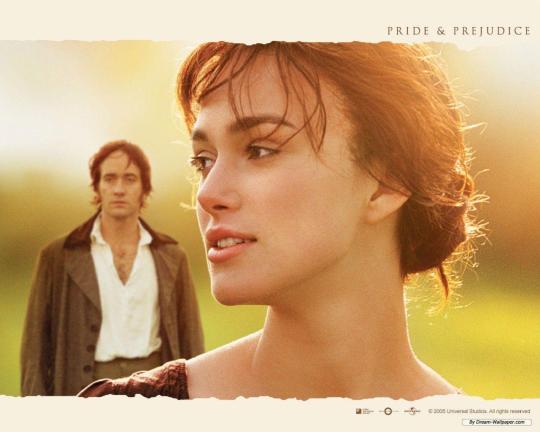
@colonelfitzwilliams @appleinducedsleep @obscurelittlebird @austengivesmeserotonin @princesssarisa @dahlia-coccinea @firawren @cobaltzosia
#book adaptation#pride and prejudice#pride and predjudice#p&p 1995#p&p 2005#keira knightley#mr darcy#lizzie x darcy#fitzwilliam darcy#charles bingley#jane x bingley#mr bingley#caroline bingley#jane austen#period film#period drama#movies#movie review#elizabeth bennet#long post
146 notes
·
View notes
Note
Hi :) If it's not too much trouble, could you please share your take on why they'd continue the Adventure brand after tri. was such a flop? (and a tangent: what does "dark history" even mean?). We got Kizuna, the reboot, and a 02 movie. Logically, it doesn't really make sense they'd keep investing in it.
This is a thorny topic, and I'd like to reiterate that although I've ended up making more posts related to this series and the discourse surrounding it recently (probably because it's even more on the mind now that another movie is on the horizon and a lot of people are apprehensive for various reasons), I do not want this blog to be making a brand out of being critical of this series. I’m writing this here and in public because I figured that there is a certain degree I need to clarify what I mean about audience reception/climate and how it might impact current or future works, and I’m admittedly also more than a little upset that I occasionally see Western fanbase criticisms of the series getting dismissed by people claiming that the only people mad about it are dramamongering or ignorant Westerners (which could not be further from the truth). However, this is mainly to address this and to answer your question, and is not intended to try and change anyone's existing opinion or impression of the series as much as it's me trying to explain (from my own personal reading of the situation) what practically went down with critical reception in real life; no more, no less.
The short summary of the matter is:
The series was a moderate financial success (albeit with some caveats; see the long version for details) and definitely outstripped a lot of prior attempts to revive the franchise;
However, the overall Japanese fanbase-side critical backlash from tri. was extremely and viciously negative to the point where even acknowledging the series too much could easily result in controversy;
Kizuna’s production and the PR surrounding it very obviously have this in mind with a lot of apparent “damage control” elements.
The long version is below.
Note that while I try to be diligent about citing my sources so people understand that I’m not just making things up wholesale, I’m deliberately refraining from linking certain things here this time, both because some of the things mentioned have some pretty crude things written there -- it’s not something I feel comfortable directing people to regardless of what language it’s in -- and because I don’t want to recklessly link things on social media and cause anyone to go after or harass the people involved. For the links that have been provided, please still be warned that some of them don’t really link to particularly pleasant things.
I am not writing the following information to suggest that anyone should agree or disagree with the sentiments being described. I know people tend to take "a lot of people like/hate this" as a signal of implication "it is correct to like/hate this" when it's not (and I especially dislike the idea of implying that Japanese fanbase opinions are the only correct ones). There's a reason I focus on "critical reception being this way" (because it influences marketing decisions and future direction) rather than how much this should impact one's personal feelings; this is coming from myself as someone who is shamelessly proud of liking many things that had bad critical reception, were financial failures, or are disliked by many. As I point out near the end, the situation also does seem to be changing for the better in more recent years as well.
Also, to be clear, I'm a single person who's observing everything best I can from my end, I have no affiliations with staff nor do I claim to, and as much as I'm capable of reading Japanese and thus reading a lot of people's impressions, I'm ultimately still another “outsider” looking in. These are my impressions from my observation of fan communal spaces, following artists and reading comments on social media and art posting websites, and results from social media searches. In the end, I know as much as anyone else about what happened, so this is just my two cents based on all of my personal observations.
A fanbase is a fanbase regardless of what part of the world you're from. There are people who love it and are shameless about saying so. There are people who have mixed feelings or at least aren't on extreme ends of the spectrum (as always, the loudest ones are always the most visible, but it's not always easy to claim they're the predominant percentage of the fanbase). That happens everywhere, and I still find that on every end I've seen. However, if I'm talking about my impressions and everything I’ve encountered, I will say that the overall Japanese reaction to tri. comes off as significantly more violently negative on average than the Western one, which is unusual because often it's the other way around. (I personally feel less so because the opinions are that fundamentally different and more so because we're honestly kind of loud and in-your-face people; otherwise, humans are mostly the same everywhere, and more often than not people feel roughly the same about everything if they’re given the same information to work with.)
This is not something I can say lightly, and thus would not say if I didn’t really get this impression, but...we're talking "casually looking up movie reviews for Kizuna have an overwhelming amount of people casually citing any acknowledgment of tri. elements as a negative element", or the fact that even communal wikis for "general" fandoms like Pixiv and Aniwota don't tend to hold back in being vicious about it (as of this writing, Pixiv's wiki refuses to consider it in the same timeline as Adventure, accusing it of being "a series that claims to be a sequel set three years after 02 but is in fact something different"). Again, there are people who openly enjoy it and actively advocate for it (and Pixiv even warns people to not lord over others about it condescendingly because of the fact that such people do exist), and this is also more of a reflection of “the hardcore fanbase on the Internet” and not necessarily the mainstream (after all, there are quite a few other Digimon works where the critical reception varies very heavily between the two). Nevertheless, the take-home is that the reputation is overall negative among the Internet fanbase to the point that this is the kind of sentiment you run into without trying all that hard.
I think, generally speaking, if we're just talking about why a lot of people resent the series, the reasons aren't that different from those on the Western side. However, that issue of "dark history" (黒歴史): there's a certain degree of demand from the more violently negative side of the fanbase that's, in a sense, asking official to treat it as a disgrace and never acknowledge it ever again, hence why Kizuna doing so much as borrowing things from it rather than rejecting it outright is still sometimes treated like it’s committing a sin. So it's somewhat close in spirit to a retcon movement, which is unusual because no other Digimon series gets this (not even 02; that was definitely a thing on the Western end, but while I'm sure there are people who hate it that much on their end too, I've never really seen it gain enough momentum for anyone to take it seriously). If anyone ever tells you that Japanese fanbases are nice to everything, either they don't know Japanese, are being willfully ignorant, or are lying to you, because there is such thing as drama in those areas, and in my experience, I've seen things get really nasty when things are sufficiently pushed over the edge, and if a fanbase wants to have drama, it will have drama. This happens to be one of those times.
(If you think this is extreme, please know that I also think so too, so I hope you really understand that me describing this sentiment does not mean I am personally endorsing it. Also, let me reiterate that the loudest section of the fanbase is not necessarily the predominant one; after all, as someone who’s been watching reactions to 02 over the years, I myself can attest that its hatedom has historically made it sound more despised than it actually is in practice.)
My impression is that the primary core sentiment behind why the series so much as existing and being validated is considered such an offense (rather than, say, just saying "wow, that writing was bad" and moving on) is heavily tied to the release circumstances the series came out in during 2015-2018, and the idea that "this series disrespected Adventure, and also disrespected the fanbase.” (I mean, really, regardless of what part of the world you’re from, sequels and adaptations tend to be held to a higher bar of expectation than standalone works, because they’re expected to do them justice.) A list of complaints I’ve come across a lot while reading through the above:
The Japanese fanbase is pretty good at recordkeeping when it comes to Adventure universe lore, partially because they got a lot of extra materials that weren’t localized, but also partially because adherence to it seems to generally be more Serious Business to them than it is elsewhere. For instance, “according to Adventure episode 45, ‘the one who wishes for stability’ (Homeostasis) only started choosing children in 1995, and therefore there can be no Chosen Children before 1995” is taken with such gravity that this, not anything to do with evolutions or timeline issues, is the main reason Hurricane Touchdown’s canonicity was disputed in that arena (because Wallace implies that he met his partners before 1995). It’s a huge reason the question of Kizuna also potentially not complying to lore came to the forefront, because tri. so flagrantly contradicts it so much that this issue became very high on the evaluation checklist. In practice, Kizuna actually goes against Adventure/02 very little, so the reason tri. in particular comes under fire for this is that it does it so blatantly there were theories as early as Part 1 that this series must take place in a parallel universe or something, and as soon as it became clear it didn’t, the resulting sentiment was “wow, you seriously thought nobody would notice?” (thus “disrespecting the audience”).
A lot of the characterization incongruity is extremely obvious when you’re following only the Japanese version, partially because it didn’t have certain localization-induced characterization changes (you are significantly less likely to notice a disparity with Mimi if you’re working off the American English dub where they actually did make her likely to step on others’ toes and be condescending, whereas in Japanese the disparity is jarring and hard to miss) and partially due to some things lost in translation (Mimi improperly using rough language on elders is much easier to spot as incongruity if you’re familiar with the language). Because it’s so difficult to miss, and honestly feels like a lot of strange writing decisions you’d make only if you really had no concept of what on earth happened in the original series, it only contributes to the idea that they were handling Adventure carelessly and disrespectfully without paying attention to what the series was even about (that, or worse, they didn’t care).
02 is generally well-liked there! It’s controversial no matter where you go, but as I said earlier, there was no way a retcon movement would have ever been taken seriously, and the predominant sentiment is that, even if you’re not a huge fan of it, its place in canon (even the epilogue) should be respected. So not only flagrantly going against 02-introduced lore but also doing that to a certain quartet is seen as malicious, and you don’t have as much of the converse discourse celebrating murdering the 02 quartet (yeah, that’s a thing that happened here) or accusing people with complaints of “just being salty because they like 02″ as nearly as much of a factor; I did see it happen, or at least dismissals akin to “well it’s Adventure targeted anyway,” but they were much less frequent. The issue with the 02 quartet is usually the first major one brought up, and there’s a lot of complaints even among those who don’t care for 02 as much that the way they went about it was inhumane and hypocritical, especially when killing Imperialdramon is fine but killing Meicoomon is a sin. Also, again, “you seriously think nobody will see a problem with how this doesn’t make sense?”
I think even those who are fans of the series generally agree with this, but part of the reason the actual real-life time this series went on is an important factor is that the PR campaign for this series was godawful. Nine months of clicking on an egg on a website pretending like audience participation meant something when in actuality it was blatantly obvious it was just a smokescreen to reveal info whenever they were ready? This resulted in a chain effect where even more innocuous/defensible things were viewed in a suspicious or negative light (for instance, "the scam of selling the fake Kaiser's goggles knowing Ken fans would buy it only to reveal that it's not him anyway"), and a bunch of progressively out-of-touch-with-the-fanbase statements and poor choices led to more sentiment “yeah, you’re just insulting the fanbase at this point,” and a general erosion of trust in official overall.
On top of that, the choice of release format to have it spread out as six movies over three years seems to have exacerbated the backlash to get much worse than it would have been otherwise, especially since one of the major grievances with the series is that how it basically strung people along, building up more and more unanswered questions before it became apparent it was never going to answer them anyway. So when you’re getting that frustrated feeling over three whole years, it feels like three years of prolonged torture, and it becomes much harder to forgive for the fallout than if you’d just marathoned the entire thing at once.
For those who are really into the Digimon (i.e. species) lore and null canon, while I’m not particularly well-versed in that side of the fanbase, it seems tri. fell afoul of them too for having inaccurately portrayed (at one point, mislabeled) special attacks and poorly done battle choreography, along with the treatment of Digimon in general (infantilized Digimon characterization, general lack of Digimon characters in general, very flippant treatment of the Digital World in Parts 3-5). If you say you’re going to “reboot” the Digital World and not address the entire can of worms that comes with basically damaging an entire civilization of Digimon, as you can imagine, a lot of people who actually really care about that are going to be pissed, and the emerging sentiment is “you’re billing this as a Digimon work, but you don’t even care about the monsters that make up this franchise.”
The director does not have a very positive reputation among those who know his work (beyond just Digimon), and in general there was a lot of suspicion around the fact they decided to get a guy whose career has primarily been built on harem and fanservice anime to direct a sequel to a children’s series. Add to that a ton of increasingly unnerving statements about how he intended to make the series “mature” in comparison to its predecessor (basically, an implication that Adventure and 02 were happy happy joy series where nothing bad ever happened) and descriptions of Adventure that implied a very, very poor grasp of anything that happened in it: inaccurate descriptions of their characters, poor awareness of 02′s place in the narrative, outright saying in Febri that he saw the Digimon as like perpetual kindergartners even after evolving, and generally such a flippant attitude that it drove home the idea that the director of an Adventure sequel had no respect for Adventure, made this series just to maliciously dunk on it for supposedly being immature, and has such a poor grasp of what it even was that it’s possible he may not have seen it in the first place (or if he did, clearly skimmed it to the extent he understood it poorly to pretty disturbing levels). As of this writing, Aniwota Wiki directly cites him as a major reason for the backlash.
In general, consensus seems to be that the most positively received aspect of the series (story-wise) was Part 3 (mostly its ending, but some are more amenable to the Takeru and Patamon drama), and the worst vitriol goes towards Parts 2 (for the blatantly contradictory portrayal of Mimi and Jou and the hypocritical killing of Imperialdramon) and 4 (basically the “point of no return” where even more optimistic people started getting really turned off). This is also what I suspect is behind the numbers on the infamous DigiPoll (although the percentage difference is admittedly low enough to fall within margin of error). However, there was suspicion about the series even from Part 1, with one prominent fanartist openly stating that it felt more like meeting a ton of new people than it did reuniting with anyone they knew.
So with all of that on the table: how did this affect official? The thing is that when I say “violently negative”, I mean that also entailed spamming official with said violently negative social media comments. While this is speculation, I am fairly certain that official must have realized how bad this was getting as early as between Parts 4 and 5, because that’s where a lot of really suspicious things started happening behind the scenes; while I imagine the anime series itself was now too far in to really do anything about it, one of the most visible producers suddenly vanished from the producer lineup and was replaced by Kinoshita Yousuke, who ended up being the only member of tri. staff shared with Kizuna (and, in general, the fact that not a single member of staff otherwise was retained kind of says a lot). Once the series ended in 2018 and the franchise slowly moved into Kizuna-related things, you might notice that tri.-branded merch production almost entirely screeched to a halt and official has been very touchy about acknowledging it too deeply; it’s not that they don’t, but it’s kind of an awfully low amount for what you’d think would be warranted for a series that’s supposed to be a full entry in the big-name Adventure brand.
The reason is, simply, that if they do acknowledge it too much, people will get pissed at them. That’s presumably why the tri. stage play (made during that interim period between Parts 4 and 5 and even branded with the title itself) and Kizuna are really hesitant to be too aggressive about tri. references; it’s not necessarily that official wants to blot it out of history like the most extreme opinions would like them to, but even being too enthusiastic about affirming it will also get them backlash, especially if the things they affirm are contradictory to Adventure or 02. And considering even the small references they did put in still got them criticism for “affirming” tri. too much, you can easily see that the backlash would have been much harder if they’d attempted more than that; staying as close as possible to Adventure and 02 and trying to deal with tri. elements only when they’re comparatively inoffensive was pretty much the “safe” thing to do in this scenario (especially since fully denying tri. would most certainly upset the people who did like the series, and if you have to ask me, I personally think this would have been a pretty crude thing to have done right after the series had just finished). Even interviews taken after the fact often involve quickly disclaiming involvement with the series, or, if they have to bring up something about it, discussing the less controversial aspects like the art (while the character designs were still controversial, it’s at least at the point where some fanartists will still be willing to make use of them even if they dislike the series, albeit often with prominent disclaimers) or the more well-received parts of Part 3; Kizuna was very conspicuously marketed as a standalone movie, even if it shared the point of “the Adventure kids, but older” that tri. had.
(Incidentally, the tri. stage play has generally been met with a good reputation and was received well even among people who were upset with the anime, so it was well-understood that they had no relation. In fact, said stage play is probably even better received than Kizuna, although that’s not too surprising given the controversial territory Kizuna goes into, making the stage play feel very play-it-safe in comparison.)
So, if we’re going to talk about Kizuna in particular: tri. was, to some degree, a moderate financial success, in the sense that it made quite a bit of money and did a lot to raise awareness of the Digimon brand still continuing...however, if you actually look at the sales figures for tri., they go down every movie; part of it was probably because of the progressively higher “hurdle” to get into a series midway, but consider that Gundam Unicorn (a movie series which tri.’s format was often compared to) had its sales go up per movie thanks to word of mouth and hype. So while tri. does seem to have gotten enough money to help sustain the franchise at first, the trade-off was an extremely livid fanbase that had shattered faith in the brand and in official, and so while continuing the Adventure brand might still be profitable, there was no way they were going to get away with continuing to do this lest everything eventually crash and burn.
Hence, if you look at the way Kizuna was produced and advertised, you can see a lot of it is blatantly geared at addressing a lot of the woes aimed at tri.: instead of the staff that had virtually no affiliation with Toei, the main members of staff announced were either from the original series (Seki and Yamatoya) or openly childhood fans, the 02 quartet was made into a huge advertising point as a dramatic DigiFes reveal (and character profies that tie into the 02 epilogue careers prominently part of the advertising from day one), and they even seemed to acknowledge the burnout on the original Adventure group by advertising it so heavily as “the last adventure of Taichi and his friends”, so you can see that there’s a huge sentiment of “damage control” with it. How successful that was...is debatable, since opinions have been all over the board; quite a few people were naturally so livid at what happened with tri. that Kizuna was just opening more of the wound, but there were also people who liked it much better and were willing to acknowledge it (with varying levels of enthusiasm, some simply saying “it was thankfully okay,” and some outright loving it), and there was a general sentiment even among those who disliked both that they at least understood what Kizuna was going for and that it didn’t feel as inherently disrespectful. (Of course, there are people who loved tri. and hated Kizuna, and there are people who loved both, too.)
Moreover, Kizuna actually has a slightly different target audience from tri.; there’s a pretty big difference between an OVA and a theatrical movie, and, quite simply, Kizuna was made under the assumption that a lot of people watching it may not have even seen tri. in the first place. An average of 11% of the country watched Adventure and 02, but the number of people who watched tri. is much smaller, in part due to the fact that its “theater” screenings were only very limited screenings compared to Kizuna being shown in theaters in Japan and worldwide, and in part due to the fact that watching six parts over three years is a pretty huge commitment for someone who may barely remember Digimon as anything beyond a show they watched as a kid, and may be liable to just fall off partway through because they simply just forgot. (Which also probably wasn’t helped by the infamously negative reputation, something that definitely wouldn’t encourage someone already on the fence.) And that’s yet another reason Kizuna couldn’t make too many concrete tri. references; being a theatrical movie, it needs to have as wide appeal as possible, and couldn’t risk locking out an audience that had a very high likelihood of not having seen it, much less to the end -- it may have somewhat been informed by tri.’s moderate financial success and precedent, but it ultimately was made for the original Adventure and 02 audience more than anything else.
I would say that, generally, while Kizuna is “controversial” for sure, reception towards the movie seems to be more positive than negative, it won over a large chunk of people who were burned out by tri., and it clearly seems to have been received well enough that it’s still being cashed in on a year after its release. The sheer existence of the upcoming 02-based movie is also probably a sign of Kizuna’s financial and critical success; Kinoshita confirmed at DigiFes 2020 that nothing was in production at the time, and stated shortly after the movie’s announcement that work on it had just started. So the decision to make it seems to have been made after eyeing Kizuna’s reception, and, moreover, the movie was initially advertised from the get-go with Kizuna’s director and writer (Taguchi and Yamatoya), meaning those two have curried enough goodwill from the fanbase that this can be used to promote the movie. (If not, you would think that having and advertising Seki would be the bigger priority.) While this is my own sentiment, I am personally doubtful official would have even considered 02 something remotely profitable enough on its own to cash in on if it weren’t for this entire sequence of events of 02′s snubbing in tri. revealing how much of a fanbase it had (especially with the sheer degree of “suspicious overcompensation” Kizuna had with its copious use of the 02 quartet and it tagging a remix of the first 02 ED on the Hanareteitemo single, followed by the drama CD and character songs), followed by Kizuna having success in advertising with them so heavily. Given all of the events between 2015 and now, it’s a bit ironic to see that 02 has now become basically the last resort to be able to continue anything in the original Adventure universe without getting too many people upset at them about it.
The bright side coming out of all of this is that, while it’s still a bit early to tell, now that we’re three years out from tri. finishing up and with Kizuna in the game, it seems there’s a possibility for things improving around tri.’s reception as well. Since a lot of the worst heated points of backlash against it have a very “you had to have been there” element (related to the PR, release schedule, and staff comments), those coming in “late” don’t have as much reason to be as pissed at it; I’ve seen at least one case of a fanartist getting back into the franchise because of Kizuna hype, watching tri. to catch up, casually criticizing it on Twitter, and moving on with their life, presumably because marathoning the whole thing being generally aware of what’ll happen in it and knowing Kizuna is coming after anyway gives you a lot less reason to be angry to the point of holding an outright grudge. Basically, even if you don’t like it, it’s much easier to actually go “yeah, didn’t like that,” not worry too much about it, and move on. Likewise, I personally get the impression that official has been starting to get a little more confident about digging up elements related to it. Unfortunately, a fairly recent tweet promoting the series getting put on streaming services still got quite a few angry comments implying that they should be deleting the scourge from the Internet instead, so there’s still a long way to go, but hopefully the following years will see things improve further...
In regards to the reboot, I -- and I think a lot of people will agree with me -- have a bit of a hard time reading what exact audience it’s trying to appeal to; we have a few hints from official that they want parents to watch it with their children, and that it may have been a necessary ploy in order to secure their original timeslot. So basically, the Adventure branding gets parents who grew up with the original series to be interested in it and to show it to their kids, and convinces Fuji TV that it might be profitable. But as most people have figured by now, the series has a completely different philosophy and writing style -- I mean, the interview itself functionally admits it’s here to be more action-oriented and to have its own identity -- and the target audience is more the kids than anything else. As for the Internet fanbase of veterans, most people have been critical of its character writing and pacing, but other than a few stragglers who are still really pissed, it hasn’t attracted all that much vitriol, probably because in the end it’s an alternate universe, it doesn’t have any obligation to adhere to anything from the original even if it uses the branding, and it’s clearly still doing its job of being a kids’ show for kids who never saw the original series nor 02, so an attempt to call it “disrespectful” to the original doesn’t have much to stand on. A good number of people who are bored of it decided it wasn’t interesting to them and dropped it without incident, while other people are generally just enjoying it for being fun, and the huge amount of Digimon franchise fanservice with underrepresented Digimon and high fidelity to null canon lore is really pleasing the side of the fanbase that’s into that (I mean, Digimon World Golemon is really deep in), so at the very least, there’s not a lot to be super-upset about.
52 notes
·
View notes
Text
Let me open this up by saying that I am the last person to defend Disney. I criticize it whenever it does something bad. That being said, with Turning Red, I’ve seen the “Disney stop turning your POC into animals!” complain come up repeatedly and I just...
There are a plethora of valid reasons to criticize Disney for; this is not one of them. For multiple reasons, so bear with me as I go through them.
For one, it generalizes something that’s a non-issue. Because for something to qualify as an issue it ought to have at least some traction. Saying it like this makes it sound like all, or at least most, POC led animated Disney movies turn their leads into animals and that is just not the case. Generalizing like this just talks over all the POC led animated Disney movies that don’t do that, it dismisses and dimishes them.
And since I like lists and I feel like some people need a reminder, here is a complete list of all POC led animated Disney movies, all the ones where the lead turns into an animal are marked bold:
The Jungle Book (1967)
Aladdin (1992)
Aladdin 2 (1994)
Pocahontas (1995)
Aladdin 3 (1996)
Mulan (1998)
Pocahontas 2 (1998)
The Emperor’s New Groove (2000)
Atlantis: The Lost Empire (2001)
Lilo & Stitch (2002)
The Jungle Book 2 (2003)
Atlantis 2 (2003)
Stitch! The Movie (2003)
Brother Bear (2003)
Mulan 2 (2004)
Lilo & Stitch 2 (2005)
Kronk’s New Groove (2005)
Leroy & Stitch (2006)
Brother Bear 2 (2006)
The Princess and the Frog (2009)
Big Hero 6 (2015)
Moana (2016)
Coco (2017)
Soul (2020)
Raya and the Last Dragon (2021)
Encanto (2021)
Turning Red (2022)
That is 5/27 movies. And yes, I am absolutely counting sequels too, because they are still also POC led animated movies. But even if for some reason you were to discount them, that’d still be 4/16. That’s not even remotely a high enough percentage to talk about a concerning pattern and they are spaced out enough that you also can’t say that it is a currently coming up pattern because yes, 5/27 would be concerning if said 5 were all the most recent ones.
There are thirteen years and six different POC led movies between this one and the last one. Thirteen years is an entire generation; and I do mean literally, because someone who was a preteen/early teen when Princess and the Frog came out would now be old enough to watch Turning Red with their own young child. Thirteen years are indeed a long enough time between two things that you can repeat a trope.
Which brings us to the final point: Turning into animals is an incredibly popular trope. Disney banks on fairy tale and folktale adaptations and fairy tale-esque stories.
It is so popular that I know five different fairy tales - not variations of the same story, but actual different stories - about people turning into frogs. Just frogs. Five. Because turning people into animals is a concept humans have always been obsessed with, a theme that can be found in most cultures, in mythology as well as fairy tales and folktales.
Disney is going to keep making movies about people turning into animals, because it’s a huge trope. It bothers you that they’re POC led, so... would you rather they make these movies with a white lead instead? Because these movies will keep happening.
This generalization irritates me because it diminishes all of the really amazing POC led animated movies Disney has made at this point. Yes, Disney’s not perfect, I am sure that Disney’s representation of POC isn’t perfect, but Coco ist the best Pixar movie in existence and Big Hero 6 and Moana were absolutely awesome, just to stay within the thirteen years separating this from the last movie that turns a POC lead into an animal. These movies don’t deserve to be treated like they don’t count just so you can be upset about a trope being used in a movie...
43 notes
·
View notes